#Which is very good and has one of my favourite Dalek stories in it- which actually also matches the stark apocalyptic vibe I guess
Photo
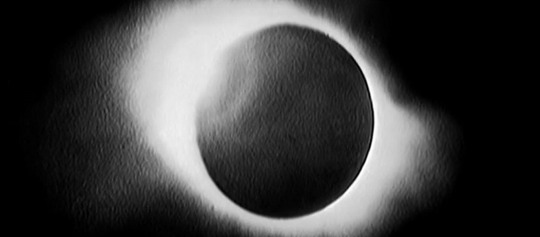
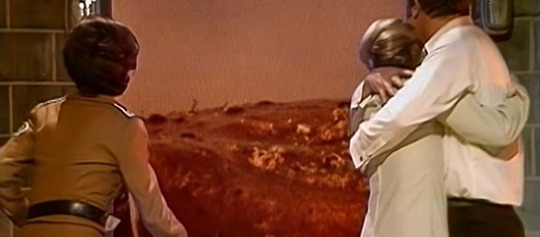
Doctor Who episodes that aired on the 13th of June…
In 1964, The Day of Darkness (the 4th episode of The Aztecs)
In 1970, Inferno Episode 6
#Doctor Who#Liz#I knew from the start what image I'd use for the penultimate episode of Inferno#The visual of the lava rolling towards the door of the shed has stuck with me since I first saw the story#bearing down on the people and the world which the Doctor has been forced to leave to die#The best visual of this Aztecs episode was probably the fight on top of the pyramid for the gorgeous costumes and backdrop#but I thought the eclipse matched Inferno's stark apocalyptic imagery too well#On this day in 2014 the first New Adventures of Bernice Summerfield audio series came out#Which is very good and has one of my favourite Dalek stories in it- which actually also matches the stark apocalyptic vibe I guess#Hopefully we'll have a more light-hearted day tomorrow#Just checked the schedule. Nope. Very much nope.#1964#1970#June
24 notes
·
View notes
Text
What your favourite Doctor says about you (just like the Master and Companion lists, this is all just jokes and my own terrible takes, absolutely no offence intended towards anyone). This is gonna be a long one, so good luck:
One (I think):
Is somehow able to sit through The Keys of Marinus whilst completely sober. Their feelings on Twice Upon a Time completely depend on whether they are able to accept that TV shows made in the 1960s will inevitably have some outdated bits or not. Loves slow-burners and less science-heavy stories, and wishes the Doctor would go back to trolling his companions again. Prays every night for The Celestial Toymaker and Marco Polo to be found. Hates the Timeless Child with a burning passion.
Two:
Two fans deserve a lot better. Despite a large chunk of their era being limited to surviving audio, PowerPoint presentations telesnaps and the, er, mixed bag of animated reconstructions, they still contribute a lot to the discussion of Classic Who and are usually well versed in the lore of the EU. 2nd Doctor fans are remarkable, as they are able to get along with pretty much every other group of fans. However, there is plenty of infighting thanks to the UNIT dating controversy and which story should be reconstructed next. If they ship Two/Jamie, they have fully earned your love and are surprisingly good if you pass them the aux.
Three:
Pretty much blows a gasket whenever some idiot says that the modern era is 'too political'. Like, I'm sorry, but was the "England for the English" scene in the Claws of Axos a little too subtle for you? Were Malcolm Hulke's scripts absolutely apolitical in your eyes? Does the mere existence of The Green Death mean nothing to you?! Oh, well maybe you should try WATCHING THE SHOW and DOING YOUR RESEARCH before you start claiming that it's become 'tOo pOLiTiCaL' because the main characters aren't always played by Whiteguy McStraight now, shouldn't you?! YOU AND YOUR MEDIOCRE OPINION SHALL COWER BEFORE MY KNOWLEDGE OF THE THIRD DOCTOR'S ERA AND THERE IS NOTHING YOU CAN DO TO STOP ME!
It is for this very reason that 3rd Doctor fans get along particularly well with 13th Doctor fans. Perfectly nice people with a great sense of humour and an excellent taste in episodes, unless a conversation resembling the above occurs, at which point you will see how much damage the repressed urge to do Venusian Akido can do. Refuses to admit that The Ambassadors of Death is two episodes too long.
Four:
Either a child of the 70s or chaos incarnate. Yes, 4 is pretty much the universally recognised Doctor, but that doesn't stop him from being one of the most unhinged Doctors. Loves more gothic horror-themed episodes and can ignore the somewhat questionable production qualities of early Baker stories. They have almost certainly attempted to make The Scarf at one point; whether they were successful or not entirely depends on their talent for knitting. Is surprisingly ok with admitting that Tom Baker stayed for a little too long and that his later seasons were a little underwhelming. Hasn't stopped them from watching every version of Shada though.
Five:
The tired parental figure of any group they are in. They immediately related to this Doctor when they saw 5 trying to hold it together whilst his multiple adopted humans argued, whined and got themselves trapped on doomed freighter ships. Has tried to play cricket once, but a general confusion over the rules and a few broken windows stopped that. You can take care of the cinnamon roll that is the standard 5 fan by providing them with cups of tea, giving them lots of hugs and removing all copies of Time Flight from your house.
Six:
Best fashion sense out of all the fans... somehow. Their favourite episodes are usually Vengeance on Varos or Revelation of the Daleks (both bangers), although they lean more heavily towards EU and Big Finish material, where the stories are more consistent and the costumes are less yikes. Either the best or worst fan to be around, either giving fair balanced views on the show or just being an absolute arse. Loves cats. Hates Michael Grade. Kind of ambivalent towards Mel.
Seven:
If 2nd Doctor fans are well versed in the EU lore, then these individuals are fucking academics. Constantly annoyed that 7 had two of the best seasons of Classic Who and was the darkest Doctor but is only remembered for Time and the Rani for some reason. Their favourite companion will always be Ace, which is what motivated them to watch Power of the Doctor. Usually excellent taste in stories, but is completely capable of dragging you to the depths of the EU. Wishes the Doctor would commit a few more genocides. Their religious beliefs can be summarised in the phrase "Cartmel Master Plan". Still annoyed that the most strategic Doctor was killed by the two most American things (guns and bad healthcare), but gets along well with 8 fans despite that. Somehow understands Ghost Light after just 3 rewatches.
Eight:
Big Finish fan. Basically willing to explain the entire plot of Dark Eyes if you ask them. Thinks the TV Movie is just OK, and has rewatched Night of the Doctor too many times to count. Loves a sad boy, and has definitely referred to 8 as a "poor little meow meow" at some point. Wishes 8's TARDIS interior was still intact and that he'll get his own live action series. Had an actual heart attack when he appeared in Power of the Doctor. Usually a bisexual from my personal experience, and looking at Paul McGann in the 90s, I can see why.
War (or is it Nine?):
We're stepping into the depths of the Moffat cult with this one. Wants a more traumatised Doctor, and kind of wishes we saw more of the Time War beyond the laser battle in Day of the Doctor. Content to sit back and watch due to the fact that the War Doctor had the perfect arc in his one episode, although they are happy that the War Doctor still pops up in the EU. Bridging the gap between the modern and classic series means they get along well with everyone except Shalka fans.
Nine (the Curse of Fatal Death one):
Does this one count? Just loves the classic series. Still praying for Joanna Lumley as the Doctor. Nowhere near as obnoxious as the Shalka fans and surprisingly funny.
Nine (the Scream of the Shalka one):
They pride themselves on being 'against the trend' and being fans of an overlooked bit of Doctor Who history. Doesn't quite realise that Scream of the Shalka was basically an B-tier Big Finish story with janky animation. Wants Richard E Grant to show up again. Constantly attempting to upset Eccleston and Hurt fans, only to get angry when everyone forgets Scream of the Shalka existed. They definitely listen to Weezer.
Ten, no, another Nine (the Eccleston one):
The word "fantastic" is permanently superglued to their vocabulary, and yet it never gets old. Owns a leather jacket too. Wishes that the BBC hadn't been stupid and Eccleston had stayed on for another series, but doesn't hold it against Tennant. Knows the Daleks were at their best in S1. Really wants the Reapers to return, and was utterly distraught after Chibs kind of ruined 9's role in the wider arc by blowing up Gallifrey again. Major nostalgia for the 2000s with this one, and is slowly becoming a member of the Big Finish cult thanks to Eccleston's return. Understandably forgot Adam was a thing. Both loves and hates John Barrowman.
Ten? Eleven? Ten and a half? The Tennant one. I hate numbers:
Their first experience to Doctor Who was during the golden age- wait, no, sorry, the RTD cult has threatened to terminate my membership if I'm not honest with this one.
Either a child of the 2000s, a member of the aforementioned RTD cult or someone who just likes the show to be more emotionally resonant. Well, that or they are the blandest person alive. If they acknowledge how good 10's arc was in terms of deconstructing the Doctor and setting up his fall from grace via misplaced attachments and vanity, then absolutely someone to be around. If they simply say "because he was popular", definitely bland. We all know Tennant was popular, it's still not one of the many valid reasons to love him. They have an easygoing relationship with 4 and 11 fans, and otherwise OK relations with the rest of Doctors fan groups, although there is a bit of friction between 13 stans due to 10 being dragged into a lot of 13's media post-2020 to boost ratings. They didn't like it because it cheapned 10's return and era whilst also overshadowing 13. 13 stans didn't like it because it basically gave the message that the BBC had given up on 13 before her era had finished.
Definitely excited for the 60th after the regeneration and the announcement of RTD's return. Has tried owning a pair of converses, only to find out that they aren't exactly cheap. Has fought for the Ten/Rose ship on multiple occasions. Tried hair gel once, with disastrous consequences.
Huh. This one was incredibly easy to write. All I had to do was look in a mirror.
Thirte- no, Eleven:
Major ADHD energy in the best possible way. Saw the chaotic excitable Doctor and immediately fell in love. They will not rest until they have forced every former Doctor to read the "Hello Stonehenge" speech. They have also cosplayed the most out of any fan, due to the availability of fezzes and bow ties. Definitely the most fun to be around at a party. Was disappointed by Matt Smith's decision not to return for the 60th, especially after the absolute banger that was Day of the Doctor. If they ship 11 with River, they're cool, even though 11 was very asexual in S5. If they ship him with anyone else, then yikes. Wishes for the show to return to a quirky fairytale tone again.
If they were present during the SuperWhoLock days, keep an eye on them. You're only one drink away from dragging us back to 2013, and I ain't reading any of that fanfiction again *shudders*.
Fourte- FUCK, Twelve:
A certified member of the Steven Moffat cult, or just someone who likes some of their stories to have a slightly more mature tone. Has tried to play the electric guitar more than once, only to be forced to stop by their partners or housemates. Either willing to admit some of the flaws of the era or strongly defends it, with no inbetween. Absolutely correct in their assertion that S9 and 10 absolutely slapped, although this cam be undermined if they try to defend Sleep No More. If they ship River and 12, then you can trust them with anything, and they will offer you good relationship advice. If they ship 12 and Clara in a romantic way (which is strange to me cos i always got platonic BFF vibes from them, but that's just me), they definitely have relationship advice, although waiting 4 billion years to get your memory wiped is a questionable means of resolving conflict. They have a pair of the sonic sunglasses. Cried when Capaldis majestic floofy hair got shaved off for a superhero film.
Thirteen? That's right? Phew, finally getting the hang of this. Ok, Thirteen:
There are two types of 13 fan. The first is cinnamoniest of rolls. Is just happy to sit back and have fun, thus allowing them to enjoy pretty much any episode (something that a lot of people could learn from). Immediately realised that Jodie is an amazing Doctor and deserves more praise and justice. Definitely shipped Thasmin, and are the best at constructive criticism, recognising what worked and didn't in a respectful, polite way (again, something we could all learn from). Wierdly enough, they get along well with all the Doctor fans, as they are a wholesome ray of sunshine that reminds us that every era has something to offer, no matter the general consensus.
The second type masquerades as the first, but gets all hipster-y and more than willing to use the term 'overrated' when RTD or Tennant are mentioned (so basically a healthy 80% of the #antiRTD tag).
Both are convinced that the Chibnall Era will receive a massive reappraisal like the 12th Doctor's era did, despite the odds of that happening being the same as an on-screen Thasmin kiss. I'm so sorry, that's a really mean line to end this bit on. Let's instead end by saying Haunting of Villa Diodati is an absolute banger of an episode.
Ruth:
Loves the admittedly cool concept of a mystery incarnation. The rest depends on their theory of where the Ruth Doctor fits in. If they use the season 6B theory, then they have an encyclopedic knowledge of the classical series and the EU regardless of whether they have watched it or not. If they use the Timeless Child/Division theory, then they basically settled for the easier version of 6B after looking into the insane asylum that is classic who and EU discourse (wise choice). If they think she's from an alternative universe, thinks that she's Omega, Rassilon, The Rani, The Master or any other figure, then they practically have a gold medal in Mental Gymnastics. Either way, all of them don't like to admit that they are unfortunately limited to 4 episodes (three of them being fairly mid, the other being a mild car crash) and a pretty good comic. Cool fashion taste. Gets along with 13 stans and, surprisingly, 2nd Doctor fans.
Fourteen- oh for fucks sake:
YOU ARE TENTH DOCTOR FANS. GO BACK TO EARLIER ON IN THE POST. YES, I KNOW THAT'S THE BBC'S OFFICIAL LINE AT THE MOMENT. YES, I KNOW YOU'RE HYPED FOR THE 60TH, I AM A HYPED RTD CULTIST TOO. JUST WAIT UNTIL SEPTEMBER. P L E A S E.
Fourt- no fifteen- no, fourteen- BBC, HAVE MERCY:
Only in the Doctor Who fandom can a Doctor who has only appeared in a brief clip and some photos have a fully developed fanbase. I should know, I've already joined it. Ncuti's photos in that suit sealed the deal. Either an RTD cultist or someone just looking forward to a fresh new direction. Also very fashionable. Has a somewhat complicated relationship with 13th Doctor fans due to the fact that Ncuti's first season and casting completely overshadowed S13 and the specials, but Ncuti also had to deal with the same levels of toxicity from the same 'fans' who threw temper tantrums at Jodie's casting in 2017. Best haircuts out of all the Doctor Who fans. Strange but true.
Full Fathom Five:
Y'all scare me.
Zagreus:
Y'all terrify me.
The Watcher:
Y'all confuse me.
The Valeyard:
Has wanted a darker series since god knows when. Was kind of annoyed when the Time Lord Victorious arc wasn't dedicated to a whole series. Also, the Valeyard is the Shadow the Hedgehog of the Whoniverse. I refuse to elaborate any further.
The Curator:
"Alright gang, let's see who the Curator fans really are!"
Pulls off mask
"Fourth Doctor fans?!"
All jokes aside, they just want a more experienced Doctor. Accepts that the show will have to end one day, and is cool with that, since they already have the perfect ending. Either cool grandad vibes or an actual grandad. Good knitwear. Their response to everything is simply putting the kettle on.
Doctor Moon:
Now these ones are very, very rare. I personally love the theory that Doctor Moon is a future version of the Doctor who is keeping River and the Library safe, but limiting your favourite Doctor to two episodes and an endorsement of the theory from Steven Moffat? Now that takes guts, and I like it. Usually partial to classy clothes, and talks in a very formal tone. Their best subject is usually maths.
Dr Who (Peter Cushing):
Unashamedly insane. Saw the absolutely glorious cheese-fest that was the 1960s Dalek movies and ended up loving one of the most unique versions of the Doctor. Is absolutely fine with bypassing 90% of the TV shows lore, making them really fun to talk to. Time Lords? Nah. Sonic screwdriver? Nope. Their Doctor is a wacky grandpa who built a multi-dimensional time machine in their back garden, and they love it. Is a sucker for Alternate Universe stories and usually loves classic B-movies. Knows that the movies kind of suck as adaptations, but as pure 1960s camp, they are unbeatable. Absolute legends.
All of Them:
The glue that holds this fanbase together. Enlightened individuals who have to check in every now and then to make sure that we mere mortals are behaving ourselves. They just simply enjoy the show and hold no biases. Absolutely infuriating to talk to for that very reason.
#doctor who#1st doctor#2nd doctor#3rd doctor#4th doctor#5th doctor#6th doctor#7th doctor#8th doctor#9th doctor#10th doctor#11th doctor#12th doctor#13th doctor#14th doctor#15th doctor#war doctor#rtd#moffat era#chibnall era#classic dw#nu who#doctor who eu#doctor who meta#doctor who funny#dr who and the daleks#doccy who#doctor who 60th anniversary#ruth doctor#fugitive doctor
262 notes
·
View notes
Text
'David Tennant had it all. As the tenth Doctor he was a fan-favourite with a run of episodes that reached more than 13 million viewers in the UK – a record for the modern revival of Doctor Who, which almost rivalled its 1970s heyday. He left on his own terms in 2010 rather than being shoved aside for a younger, cooler star (in fact, the BBC wanted him to stay longer). His legacy set him up for lucrative convention appearances and fan worship for life, while his post-Who career is flourishing. So why risk it all by returning?
“I hadn’t thought about it like that,” Tennant laughs. “Thank God I made it to this point! It never really occurred to me to worry about that. Perhaps it should have done…but with Catherine [Tate] being part of it, and with Russell [T Davies] writing the scripts, I never actually worried about anything other than my own ability to run as fast as I used to.”
In fairness, while the return of old favourites to a stage they’ve vacated can sometimes tarnish a legacy, Tennant’s Doctor is a special case. Apart from Tom Baker, it’s hard to think of a Doctor Who star who so captured the public’s imagination. At the height of his career on the show, Tennant was plastered on magazine covers and lunchboxes; he was accosted in the street. In 2009, he was the BBC’s Christmas ident. By the time he left, aged 39, one suspects he could have been reading the phone book to a Dalek and viewers would still have tuned in.
Happily this comeback, announced to great fanfare last year, is a little more involved than that. “The first conversation we had about it was very casual,” Tennant recalls. “Russell and Catherine were talking about the notion of: ‘What if we got the band back together for one last special? But David would never do it.’ And I said, ‘What do you mean I’d never do it? I’d do it in a shot. And then suddenly, we were back for three in a row.
“I mean, why not?” he laughs. “It was such a joyous time, and these are people I love as humans, and certainly love as people to work with. And Doctor Who is something that will always be hugely important to me.”
In fact, there’s a case to be made that the 52-year-old Tennant – who’s speaking to us the day after his birthday, ever committed to the show – never really left Doctor Who behind in the first place. Yes, he’s had many successes since – Broadchurch, Good Omens, Des, Marvel’s Jessica Jones and Staged to name but a few – but he’s always kept a foot in the TARDIS door. After all, it was just three years after his dramatic regeneration that he teamed up with his successor Matt Smith for 2013’s 50th-anniversary special.
“I was sort of a member of the guest cast on that, because it was Matt’s show,” says Tennant now. “It’s different when you’re in charge of the TARDIS again. There’s a lot more work to do. I remember on the 50th, going, ‘Oh, this is easy. I used to have to learn far more lines than this!’”
Two years after that, Tennant was back headlining his own Doctor Who stories for a series of audio dramas co-starring – and this sounds familiar – ex-companion Catherine Tate. He’s kept playing the Doctor that way ever since, lending his voice to audio plays and (more recently) video games starring his character.
The Doctor even looms large in Tennant’s personal life. He married a guest actor on the series – Georgia Moffett, who appeared in a 2008 episode with him – which means his father-in-law is former fifth Doctor Peter Davison. He also has a police box cut-out in his garden. Given all this, it’s hard to imagine why Davies and Tate thought this on-screen return would be a hard sell.
“The truth is, it’s a rather lovely, benevolent, generous thing to be connected with. I love it. I always have, and I’m sure I always will,” says Tennant. “I grew up with posters on my wall signed by Tom Baker. It’s very peculiar that I should end up in the show that was, to a greater or lesser extent, the thing that inspired me to be in the profession I’m in.
“It runs through my life as if through a stick of rock, really. As you say, I met my wife on the set of Doctor Who, and I’m now a father. I’ve given up trying to resist the inevitability that Doctor Who will be following me around for the rest of time.”
Instead, he’s embraced it. So, this week he returns as the Doctor on BBC1 – but not the same one he played before. Originally, Tennant says the plan was for him and Tate to return for the anniversary in a flashback episode, set during their shared 2008 series and with a storyline completely different from the specials as they now exist.
“It would have been an unseen adventure from years before,” he says. “Russell immediately had an idea for a story, which I’m not going to mention because I don’t think it’s yet seen the light of day. It certainly wouldn’t have been part of an ongoing story. But I hope one day he does use it because it sounded great.”
But Davies’s return to the BBC fold as the new Who showrunner changed everything. “Then Russell decided he was coming back full-time and the whole thing blossomed,” says Tennant. Suddenly, the one-off had turned into a trio of specials for Doctor Who’s 60th anniversary.
Davies tells me later: “It was simply as many episodes as David and Catherine could do. If they had said, ‘We’ve got time to make 12,’ we would have made 12. If they had said, ‘We’ve got time to make one,’ then we’d have made one. But I think a one-off would have been a disappointment.”
And it was a flashback no longer. Instead, Tennant plays a new (and official) incarnation of the Doctor that follows on from his younger self and the Doctors that came after – Matt Smith, Peter Capaldi and Jodie Whittaker – in a way that’s woven into the story of the specials (titled The Star Beast, Wild Blue Yonder and The Giggle).
“That’s part of what the Doctor himself is struggling with: why is he here?” says Tennant. “Why has he got this face back, and what might that mean? Though you’re still in a recognisably Doctor Who world, and I think that’s right and proper,” he adds. “It gets you back into those stories that you know and love and recognise, with some elements in there that are unexpected.”
In particular, he says that the second and third specials go in unusual directions. “With two and three, Russell has written Doctor Who like I have never seen it before,” he reveals. “He’s come back to it with a whole new raft of ideas and enthusiasm. I’m just very chuffed to be able to be part of that.”
But of course, he’s not going to be part of it for long. Davies describes Tennant’s new incarnation as a “Magnesium Doctor” – in other words, he burns brightly but not for long – because at the end of the third special, airing on 9 December, he’ll regenerate into new Doctor Ncuti Gatwa. The 31-year-old Sex Education star takes over for the Christmas special, followed by a full series next year (and beyond – he’s already filming episodes that will be shown in 2025).
“I have seen a bit of Ncuti, and he’s magnificent,” Tennant says. “He’s just got such an energy. He’s so creative, and he’s inventive, and he’s funny, and he’s a proper actor. I think he’s going to be great.
“I’ve met Millie Gibson [new companion Ruby], and she seems lovely, too. I haven’t got a chance to see any of her stuff yet, but they seem great together. I’m jealous of the adventure they’ve got in front of them.”
When asked if he has any advice for his successor, Tennant seems vaguely horrified – “What would I say? I mean, literally, what would I say?” I suggest he might prepare Gatwa to return in about 18 years. “Well, he’s young,” Tennant laughs. “He’ll get into the 100th anniversary, probably. I don’t know if I’ll make it that far. Though if I can keep running fast enough –
I don’t know. I never imagined that I would be sitting there for the 60th anniversary, talking about three specials we’d made. This show continues to surprise everyone involved with it.”
Still, it must be hard to hand over the TARDIS so soon after getting hold of it again. Was there a moment, just for a second, where he thought about snatching back the sonic screwdriver, barricading the studio and staying on for a full series?
Even as a lifelong fan, he says not. “It was never on the table,” Tennant says firmly. “The story – well, as soon as I start to talk about this, we get into the area of spoilers, so I’m not going to say any more. All I know is that I’m excited and jealous of everything that Ncuti has in front of him. And I can’t wait to enjoy it as a viewer, because I think he’s magnificent.”
He laughs. “I think they thought, ‘Let the old man run around for a minute – and then we’ll get a nice, young bloke in.’ ”'
#David Tennant#Millie Gibson#Ncuti Gatwa#Catherine Tate#Donna Noble#60th Anniversary#The Day of the Doctor#Matt Smith#Russell T. Davies#Georgia Moffett#Ruby Sunday#Tom Baker#Good Omens#Broadchurch#Des#Marvel's Jessica Jones#Staged#Peter Davison#Peter Capaldi#Jodie Whittaker#The Star Beast#Wild Blue Yonder#The Giggle
27 notes
·
View notes
Text
DOCTOR WHO TOP 10 - 9th Doctor
Ninth Doctor. I love him, you probably love him too. He's great. Let's go.
10. The Cruel Sea

Rob Shearman's very weird comic strip. Admittedly, I love it to bits. While I think Shearman wasn't entirely sure about what he's doing, the result is still by far ninth Doctor's best DWM comic. (Okay, I also really like Scott Gray's Monstrous Beauty, it just didn't make the list.)
9. The Beast of Babylon

I love xenofiction and Doctor Who should do it more often.
8. The Sin-Eaters
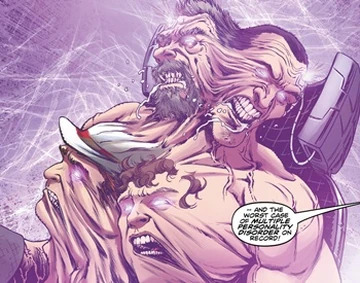
Ninth Doctor's Titan comic book run by Cavan Scott is on the whole pretty solid. (And preferable to ninth Doctor's 2005 DWM run, which just has too much Gareth Roberts to be any good.) I can definitely recommend the whole thing. Not everything in there is amazing, but there's a lot to like about it.
This story is my personal highlight of the run. Twisted, clever, and fun. The Sin-Eaters just slaps.
7. The End of the World
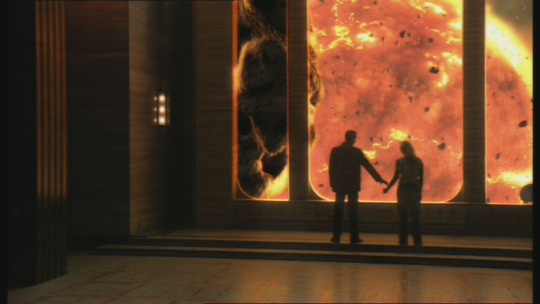
The moment Tainted Love starts playing, you know you're in for something amazing.
I just love this episode... It's the first episode of New Who that really gets to show off the scope of "the alien" in this universe. I adore the creativity of it, the energy of it. And Lady Cassandra O'Brien.Δ17, of course. So many iconic moments in this one.
6. Bad Wolf / Parting of the Ways

The big finale, of course. Huge, emotional, epic... but also featuring some biting satire about the landscape of television. The perfect finale to the first series.
5. The Stealers of Dreams
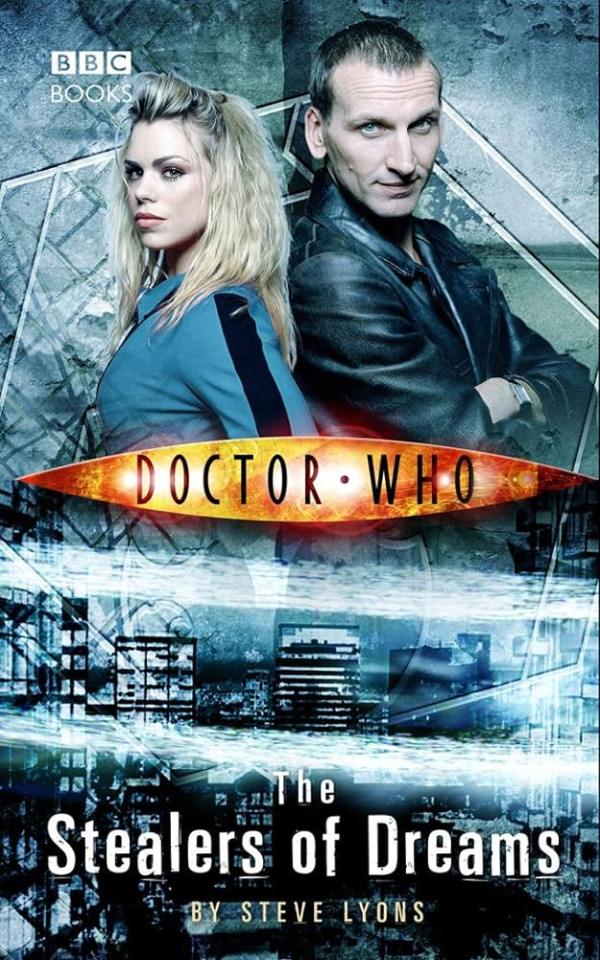
My favourite ninth Doctor book. It's kinda Cartmelian in it's premise, but also deals with the new reality for the eu - Doctor Who being back on TV. This is a stunning Who novel and it should get a lot more attention than it does. Steve Lyons is awesome.
4. Monsters in Metropolis

Historicals about film history are great and there should be more of them. Also, this one made me cry, so there's that. I love Monsters in Metropolis so goddamn much, thank you John Dorney.
3. Planet of the End

After listening to the first series of Big Finish's The Ninth Doctor Adventures, one gets a pretty clear sense that Respond to All Calls is the strongest of the four boxsets, by a pretty wide margin.
My favourite of that boxset has to be Planet of the End by Timothy X Atack. There's just something about the size of the ideas in this one... Fred is an amazing character, the Incorporation are truly villainous... Just thinking about this one makes me want to listen to it again.
2. Dalek
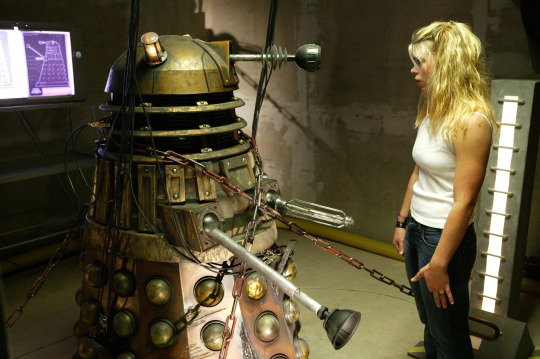
Rob Shearman resurrects Daleks. Well... just one, to be precise. But it's all he needs to craft one of the greatest Dalek stories every. Every line is gold, the story is poignant and meaningful, the characters are memorable... And it's a Base Under Siege story where the monster is trying to get out instead of getting in. What more do you want?
1. The Empty Child / The Doctor Dances

What else could it be? Steven Moffat's Hilarious & Horny Horror For Children, also known as The Empty Child two-parter, has become such an iconic and defining bit of Doctor Who. I feel like everyone loves it and for good reasons. It's absolutely deserving of all the hype and acclaim. And... You know... Everybody lives!
#doctor who#9th doctor#ninth doctor#christopher ecclestone#doctor who eu#60th anniversary#top 10#dfpost
13 notes
·
View notes
Text
Want to take a sec to compare some aspects of all the different doctor who show runners to try and explain why I’m so excited for the return of Russell T Davies. This isn’t me trying to say that his era is the only good era or that he’s the only good writer, just why I’m excited for his return to DW.
Chibnall:
- lots of his stories are set on earth in the modern day and there is limited exploration of other planets.
-Many of his characters feel underused and one dimensional. For example, the introduction to Dan in series 13 was great and gave Dan a great personality, but then he had very little to do and was not missed when he left TPOTD after 10 minutes. He mostly served as comic relief and to ask the doctor questions.
-The timeless child story arc made very little sense and was a bad idea.
- very mixed bag in terms of monster design and use. I liked some of the Dalek stories quite a bit though
Moffat:
- his characters had interesting personalities (Clara is not to my taste but that’s just me) but they often had no backstory and very little to ground them in reality. They feel like fairytale people plucked from thin air. They do get plenty to do throughout their stories but they are always Special TM which again leaves them ungrounded.
-absolutely wasted use of Daleks and Cybermen. I loved Missy though, her character arc in series 10 was amazing.
-some of the best episodes of the show are written by Moffat. No matter your opinion of him as a show runner, he was definitely a great episode writer.
-fun alien concepts (especially the silence) and fun exploration of other worlds.
- series arcs were often confusing and a little nonsensical but they were fun and kept me watching anyway.
Davies:
- great characters with backstories, families, lives outside of their life with the doctor, and a strong grounding in reality. Compare Rose to Ryan in terms of what you know about her life outside of the doctor. She is flawed and human and not special at all. She saves the world by doing a stupid human thing and has to get saved, it’s a great scene.
- interesting alien worlds and ideas, although mostly from series 2 onwards.
- mixed bag with alien inventions but some truly great ones like the devil, the judoon, and the family of the blood. Handles classic villains well and keeps them scary by not using them too much. His version of the cybermen used to give me nightmares.
- great series arcs that make sense even if they have some slightly questionable endings.
Neither of the three were perfect and all made some entertaining TV with some fun ideas and characters. When it comes down to it I really don’t think people have stopped watching because they didn’t like a woman doctor or an old doctor or whatever nonsense. They have stopped watching because the writing was inconsistent and ungrounded. I’m my opinion Davies handles show running in its entirety the best, has characters that feel more grounded and relatable, and write great stories with great ideas without overusing classic villains. Like it or not, there is a reason his era was so popular and it wasn’t just because of David (although he is my favourite doctor). I’m hoping Davies can continue what he started while creating something entirely new with Ncuti and bringing back viewers who have left.
#doctor who#David tennant#Steven Moffat#Chris chibnall#Jodie Whittaker#the power of the doctor#russell t davies#not trying to hate on chibnall bc he’s not all bad#also want to make it clear I’ve watched every episode of new who wether I’ve liked the writers or not
28 notes
·
View notes
Text
DW Positivity Drive
Saw @jolivira doing this - a drive to share what we love about doctor who - and wanted to spread some more positivity! Heads up, it's mostly about 13's era, lol.
Thirteen. She's just - ahhhh. My absolute favourite doctor ever. I never knew how much I wanted to see a woman playing the doctor until I watched 13. I love her energy, how she moves and bounds across the screen, how she delivers her awe-speeches and her anger too (her rage against the Master is just *chef's kiss*). Her way of delivering emotion too. I also love her outfit! It's so cool. The magenta shirt is a favourite, but I love her coat the best.
Thasmin. What can I say about this, other than it's everything I ever wanted? I've shipped Yaz and 13 since their first ever episode. I fel the vibes from them, and to see it be canon on screen is a feeling that will never leave. I adore the way they interact together, especially as s12 hits and that slow burn/crush/feelings make themselves obvious. Their hints that are scattered in s12 are magical - the lingering look in Praxeus, the comparison with Bryon and the 'get off me, Yaz' bits are just more ahhhh! I love how it pans over into flux (the hug!! The way they fly the TARDIS together!!) and into the love story of the specials.
Which need their own point: the 13 specials. All of them are just such favourites. Time loops and daleks and love confessions! And then LOTSD is one of the eps I will always remember just watching with my jaw dropped in amazement. And TPOTD is, imo, one of the best finales in dw. The independance and beautiful drive Yaz has. The hand/arm touch when 13's regenerating. The bridal carry! The implict and very much there intimacy the two have, where it's almost like the viewer is intruding.
Yaz Khan. I adore Yaz. She's one of my favourite companions. Her journey through the series - how she grows and develops herself. Yaz's arc is so subtle and beautiful and amazing, and it really shines now her whole era is done. She's such a good character, and I love how she stopped taking 13's shit and confronted her, and actually got so much of 13 told to her, and got to experience her first taste of love. How she'll be able to go on in her life now knowing what she's capable of, and that she deserves everything. And I will always love the fact that she can fly the TARDIS.
And of course, Mandip and Jodie specifically, because their acting was phenomenal. Towards the thasmin scenes and in general too.
Thirteen's TARDIS. It's honestly so beautiful. I love the colouring and the vibes, and how warm and cost it could feel and how cold and alien it looked in s12. It's such an organic structure, and really looked fascinating and alien.
Dhawan's Master. He is hands down the best for me. He's amazing in acting, he brings such energy and gusto. His chaotic evil, lashing out and hoping for that strike, his gambling, has made him so good to watch. His anger is explosive, his humour is great, and the way he interacted with 13/Jodie just was so good. The Rasputin dance scene - just wow, lol.
For S11 eps: Demons of the Punjab. What a stunning, heart-wrenching ep. And The Tsuranga Conumdrum since it's probably my favourite of s11 and I love the story progression. Also the 'come to daddy. I mean mummy' line in Ghost Monument.
Chibnall. I love how his era went (It's, if you can't tell, my favourite). The ideas he used, his timeless child arc and how it relates to adoption and abuse. The fact he gave us canon thasmin. How he brought in the 'terrible/imperial time lords' again, with the timeless child. The existence of Karvanista. How he ended his era in a perfect way, that wasn't devestating or grimdark but fit the natural tradegy every doctor must face while also giving Yaz a whole life to explore from now on - how every 13 companion got to live and go home too.
Martha Jones. She was my first favourite companion and I adore her personality and her sense of self and drive. And that leather jacket! (Smith and Jones will always be a favourite ep for me too, because of how cool Martha is in it).
The Runaway Bride and Partners in Crime. They're absolutely hilarious eps I love coming back to.
Lastly, I love the doctor themselves. How they are a character who is so full of love and will gladly sacrifice themselves to save their chosen home and people. They have flaws, but at their core all they want to do is help and be loved and love.
All I can think of right now - if you've reached the end, go and make your own post to keep sharing the positivity! <3
#dw positivity drive#doctor who#thasmin#loved this idea#I adore just getting to gush about favourite bits in this show#yaz khan#thirteen#13
15 notes
·
View notes
Text
There's a Dalek sale on at Big Finish at the moment (and they have SO many Dalek stories), so real quick: recs! My favourite Dalek audios, in release order, speedrun.
Terror Firma (walks a really weird line between over-the-top grimdark and parody that's a really fucking wild ride, but bizarrely enjoyable)
The Elite (just straight-up grimdark, shows off the scariest thing about the Daleks)
New Adventures of Bernice Summerfield Volume 1 (the Dalek story at the end is more like a series of Dalek vignettes, but I really like what it does with it)
The Companion Chronicles First Doctor Volume Two (has a really good Dalek story in it featuring Steven, and also has a bunch of other really good stories- one of my favourite box sets)
Daughter of the Gods (fantastic multi-Doctor story that's the perfect tie-in to Katarina's story from season 3 and The Daleks' Master Plan).
Runners up from the list of releases Big Finish put on sale:
Jubilee (fucked up nightmare that handily shows off how humans are so like Daleks)
Davros (no actual Daleks in this one, but listening to Davros rant and rave while Six antagonises him is great fun)
Dark Eyes 3 (again no Daleks in this one, but a good 4-hour epic featuring Eight, Liv, Narvin, and the Master)
The Eighth Doctor Time War Volume One (one of Big Finish's best Time War sets tbh, just some solid eps)
Shadow of the Daleks 1 and 2 (one of the more creative Dalek stories which is actually a set of largely Dalek-free short stories that string together)
The Lost Resort and Other Stories (the end of original companion Marc- the Dalek episode isn't that interesting imo but the titular Lost Resort is very good)
Companion Chronicles Second Doctor Volume Three (another set of solid stories that include some lovely character pieces and one out-and-out comedy)
28 notes
·
View notes
Text
A Whovian Watches Star Trek for the First Time: Part 026 - Ravages of a War Across Time
Star Trek: Enterprise - Season 2 Episode 1 - Shockwave Part 2

It felt like an accomplishment changing that Season number. Anyways, I wanna know how that cliff-hanger gets resolved. Onwards!
This episode really had two moving plots. The Situation on the enterprise and Archer and Daniels in the future. There was also the Vulcan Human tensions reaching a boiling point on Earth due to the Enterprise not returning, but that was more background than a plot thread.
The episode opens with T'Pol convincing the Suliban to board enterprise to confirm Archer's absence, instead of just blowing enterprise out of the Sky. With Silik's takeover of the enterprise, the acting is great. You really feel that if any of the Enterprise's crew mess up here, they all could die. Then, we cut back to Silik trying to contact shadow future guy, who is just gone, obviously because the future is dead. The scene where the Suliban are torturing T'Pol was also excellent, the camera not staying still or focussing on anything is a simple cinematic trick, but an effective one. I liked seeing Trip flex his engineering skills by establishing a secret comms system across Enterprise.
Meanwhile in the future, Archer poses an important question: How is Daniels still here if his future and everything in it is gone. Daniels doesn't have an answer. Thankfully, a library with books survived, which means we can get a good read (pun not intended) on how the timeline has shifted. The Two of them trying to fashion together a cross-time communication device out of scraps was very Doctor Who, I loved that. It reminded me of the Junkyard TARDIS from The Doctor's Wife. It was also nice to see Daniel's prevent Archer reading about Earth's future. Not only because I don't want to be spoiled for the future, but also because it's good to see him still abide by whatever time laws there are, even at a time like this.
T'Pol being too broken post-torture to effectively answer Archer's time communications was painful. Like with Part 1, the whole cast's skills are being pushed to their limits with building their small resistance against the Suliban occupying the ship. I remember one of the really early episodes mentioned Hoshi gets claustrophobic, so I'm proud of her for managing to complete that vent crawl. The crew faking the engines exploding to get away was genuis, and then Archer exploiting Silik's inability to act without his orders from the future to get his way back to the present was also really good. I had the biggest smile when Archer came through instead of Shadowy-future guy.
Archer's speech to Starfleet command about how Humans need to make mistakes to learn from them, to convince them allow Enterprise's mission to continue was great.
Comparing my Enjoyment of this Episode with a Doctor Who Universe Story of the Same Title
The War Master: Anti-Genesis Part 3: Shockwave
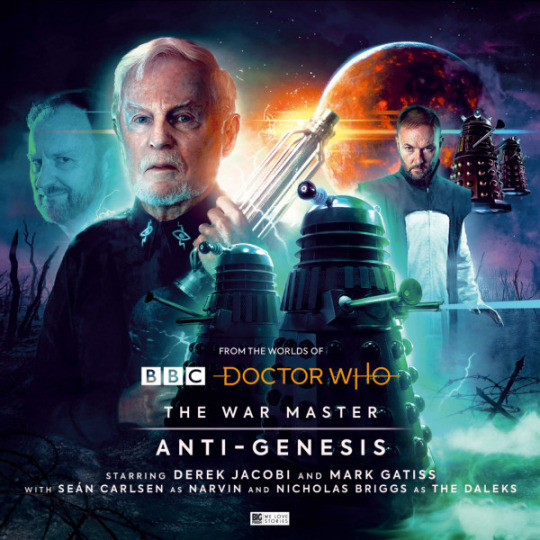
From one Time War to another, The War Master is a Doctor Who radio play Spin-Off. It functions as a pseudo prequel to the 2007 episode "Utopia", and showcases the Derek Jacobi incarnation of the Master, during the Last Great Time and the events leading up the him running away to hide at the end of the Universe as Professor Yana.
Shockwave is the third part of Anti-Genesis the fourth release of the War Master series. I want to focus on shockwave, so I'll keep the key information from the first 2 parts brief. Basically the plot of Anti-Genesis is The Master stepping into the events of the 1975 serial Genesis of the Daleks in an attempt to alter both Dalek and Time Lord history in his own favour. Instead of the Fourth Doctor's failed attempt to prevent the Dalek's creation, we have The Master infiltrating the Kaled science elite and subverting their creation for his own purposes, while being chased down by Coordinator Narvin (My personal favourite Time Lord btw), and that's the set up going into Shockwave.
As it turns out, The Time War era Daleks don't particularly like having their creation subverted towards a Time Lord's interests. So, they decide to fight fire with fire, and bring a version of The Master from a parallel universe into play. Specifically the Mark Gatiss/Sam Kisgart version of the Master from the Unbound Universe. And happy to be escaping his own collapsing universe, he obliges. Despite it being his series, the Derek Jacobi master isn't the focus in Shockwave, this part was supposed to build up the Unbound Master for the two versions of the Character's conflict in the finale of Anti-Genesis.
The Shockwave the title is about is a result of the actions of the Derek Jacobi Master in the previous part's of Anti-Genesis. Specifically the shockwave of effect on the timeline caused by his interference.
It's interesting hearing things from the perspective of the Unbound Master, as the timelines shift around him. When he arrives on Gallifrey, shifts to the timeline have resulted in the Time Lord's civilisation reduced to medieval technology, then a time shockwave hits, and we're back to regular Gallifreyan technology, but with differences. And this is repeated a few times. A few might be a stretch, according to the Daleks, their time ship visited 713 different Gallifreys.
Picking which of the two Shockwaves I liked more is a difficult choice. I'm going to give the Edge to the War Master's version. It definitely had more fun with it's apocalyptic time shenanigans, and The Unbound Master makes a fun villain-protagonist. His attempts to convince the Time Lords that his interests align with them, and not his main universe's counterparts was fun. The War Master's brief appearances, scheming in preparation for the finale of Anti-Genesis were also fun.
Enterprise's Shockwave Part 2 was still really good though, and I'm looking forward to whatever else Season 2 brings
#whovian watching star trek#star trek#star trek enterprise#star trek ent#star trek: enterprise#enterprise#ent
4 notes
·
View notes
Note
say, if some observer (myself) had become quite captivated by your two-posting, and wanted to get started in watching/interpreting/otherwise exploring that suite of stories, might you have any recommendations on where to begin? for your enjoyment of mr jamie mccrimmon has worn off on me quite swiftly, and now the best description of our situation is that he is my blorbo-in-law and I am happily clapping along with you as he does so very well in his part as second tree from the left in the school play.
gfdlks first of all I love the way you have phrased this it is delightful <3 I am absolutely going wild watching jamie play second tree from the left. good for him.
in terms of getting started with two's era. it's kind of complicated by the number of missing episodes. if you're already aware of this, bear with me - if you're not, in the 60s the bbc had a policy of junking tapes to save on storage space, so a lot of two's episodes were wiped. some of them have now been recovered, or have been given animated episodes (which are kind of polarising - they're very much not my cup of tea, but I know some people really like them!), but others still only exist as audio recordings and still images.
that being said, I think there's a few options for where to start!
series 4
one's regeneration into two takes place partway through series 4, at the end of the tenth planet. his companions at that point are ben and polly, who carry on for most of the rest of series 4. if you're serious about watching two's era chronologically, you could start with the tenth planet and then carry on into two's era properly - it is partially missing, but it's a good story imo. it also features the debut of the cybermen (who are the most frequent recurring villain in two's era), and makes really good use of them, in a way which is quite different from a lot of other cybermen stories (really hammering home the body horror and their origins).
alternately, you could start with power of the daleks, two's first full serial - as the title gives away, it's a dalek story, and has a very tense, almost psychological plot in a pretty constrained space. unfortunately it's entirely missing, but there is an animation if you don't mind those! on the flip side it is a bit of a slow build, and two is still very new as an incarnation and has yet to settle into his character, so I'm not sure I'd necessarily recommend it as a starting point unless you're serious about doing things chronologically
jamie arrives in the next serial, the highlanders. while I genuinely think this is a great serial, and will always cite it as my favourite doctor who story, I'm not sure if I'd recommend it as one to start with. again, it's missing in its entirety. it is a great story with a good balance of humour and some decidedly dark moments though, so look forward to it when you do get around to it!
similarly I'm not sure if any of the other season 4 serials would make a good starting point. they all have missing episodes, and as much as I adore them, I don't really feel like they're great introductions. (and if it's jamie content you're looking for, he was a very last-minute addition to the tardis team, so he doesn't take a super prominent role in any of them!) if you did want to start with one of them, the moonbase would probably be my pick (a cyberman story, there are animations available to fill in the missing episode gaps, it's only four episodes, and I think it's a good story!)
series 5
series 5 is where things start to pick up in terms of introduction points. series 4 closes with ben and polly leaving, and the introduction of victoria - she arrives in evil of the daleks - although it's a super strong dalek story, it's entirely missing, and I think the weight of it depends at least in part on knowing two and jamie's characters and dynamic beforehand, so I wouldn't recommend starting with it.
the first serial of series 5 is tomb of the cybermen, which is often held up as a really good serial, and recommended as a starting point for two. it /is/ an interesting cyberman story, has some great character moments for two in particular, and all of the episodes still exist. however, it's very much of its time, and contains some pretty heavy racism. if you have the privilege of being able to sit back and watch it /as/ a product of its time, then it's not a bad place to start, but it can make for uncomfortable viewing, so if you're just looking to have a good time it might not be the best pick.
the two serials I would recommend here are enemy of the world and the web of fear. enemy of the world is complete, is a very ambitious and engaging story, has some GREAT jamie content, and also has a lot for two to do/really shows off patrick troughton as an actor. (there is also some dodgy race stuff here though, most notably in patrick troughton playing a character who's meant to be mexican). it's very much doctor who does a spy thriller, with no real alien threat, just humans causing problems for themselves. although it does stand out from the rest of the era/the show in general, if you're looking for an introduction to the characters, I think it could be really effective.
the web of fear also has a lot for the characters to do - and if you're familiar with later doctor who, especially series 7b of new who, you'll probably find a lot of references falling into place! it's the first introduction of the brigadier, which is fun. it does feature a recurring villain (the great intelligence/the yeti) from the abominable snowmen, but you can definitely watch it on its own. again it's a very tense plot in a constrained space, and it plays really well on that to create suspicion and keep you guessing. one episode is missing, but there is an animation available - or you could use it as a test to see how you go with reconstructions!
series 6
a lot of people cite series 6 as their favourite two series, and I think the tardis team of two, jamie, and zoe is probably the most popular, so series 6 could also be a good place to start. victoria leaves at the end of series 5, in fury from the deep, and zoe then arrives in the wheel in space. theoretically you could start here, but it has a fair few missing episodes, and I'm not sure it's a particularly strong one to start with.
the mind robber is a perennial favourite of a lot of people, and it's another one of those serials that's quite different to the rest of the show - in this case it's a journey into another universe, where fiction comes to life. it's a lot of fun, gives all the characters a lot to do, and has the very famous sequence where two puts jamie's face together wrong, because he had to be played by a different actor for an episode. the first episode might seem a little out there/confusing, but stick with it if you decide to start here!
the invasion might be a better pick! the brigadier returns here, and unit makes their debut. it's another story that's been referenced a /lot/ in later doctor who content, probably most often with the image of the cybermen outside st paul's cathedral. the plot has a fair amount of resonance today (greedy corporations, the danger of monopolies, power-hungry businessmen), and although it's a bit of a longer serial, I think the plot is strong enough to carry you through. many of the scenes are absolute Classics (especially if you happened to be interested in two/jamie!)
series 6 concludes with the war games, which. I wouldn't recommend starting here at all, but absolutely look forward to it when you get there. it's a juggernaut of a serial, but it's absolutely brilliant, and has the first on-screen appearance of gallifrey/the first time the time lords are named.
I would absolutely say start with the televised content tbh. this is doctor who, so there's quite a bit of extended universe content out there for two's era (which can be a mixed bag in terms of quality/characterisation imo), but the tv show is the baseline everything is drawing from. which is great, because fundamentally the people who are writing eu content are in the same position to those of us interpreting the tv show just as fans, or creating fan content! so in terms of getting into the two-era eu material:
books/short stories
imo the absolute best two eu content comes from the big finish short trip anthologies (books with compilations of short stories). because they're short format, often they're less about the plot, and more about the characters. they can be a bit tricky to track down, but if you can get hold of them, I'd recommend the two stories in destination prague (absolute god tier two/jamie content, and some really interesting stuff about two dealing with grief/death), the quality of leadership (jamie meets william wallace, and has to grapple with one of his heroes not living up to his expectations), and life science (two, jamie, and victoria arrive at the house of one of victoria's father's colleagues, and find that he's been raising the dead; this one lives in my head rent free for jamie and victoria content)
there are also a few novels - the roundheads is probably my favourite (two, jamie, ben, and polly go back to the 1600s, and have to find their way through cromwell-era london - it's got some really great scenes in it). the wheel of ice is also a good read, and the most recent two-era novel imo? though it has some weird characterisation beats (two calling jamie 'boy', which is a pet peeve of mine and never appears in the tv show). absolutely do NOT read the indestructible man until you're well into this era it is NOT to be read lightly
& then there's target novelisations of some of the serials - they were written quite a bit later and so often change aspects of the original stories, for better or for worse, so I wouldn't necessarily recommend starting with them, but if you really enjoy a particular serial it can be worth chasing up a novelisation! they do often add extra bits of detail or flesh out side characters a bit more
audios
big finish's audio two content is uhhh. quite hit and miss imo. and their older stuff tends to be better, at least for my tastes. I would absolutely recommend the jigsaw war (jamie gets caught in a timeline puzzle which he has to solve - it's a story which doesn't undersell his intelligence like so many bits of eu media do, and it also relies quite heavily on his relationship with two), the glorious revolution (two, jamie, and zoe travel back to 1689, and jamie has to grapple with whether or not to prevent the '45 from ever happening), the selachian gambit (two, jamie, ben, and polly get caught up in a bank robbery; this is just a bit of a romp but it's heaps of fun and has some great jamie, ben, and polly content), and helicon prime (again god tier two/jamie content - the story itself is pretty good, but tbh I think the appeal is mostly just two and jamie hanging out at a space resort).
hopefully this helps!! I know it's a lot of information ahgjfkd. & at the end of the day if you come into all this with a desire to enjoy and appreciate what content you find, there's really no wrong way to start imo. I started with two's story in 12 doctors 12 stories, which I would not recommend in a million years. but here I am, 7+ years later. still rotating these little guys like mad.
this is all just my opinion though - if you are going to get into two's era I would really recommend joining creagantuire's two-era discord server! (the post linked says it's a two/jamie server - we do have a bit of a two/jamie leaning but it's a server for all of two's era really). it's very chill and other people might have some more recommendations, especially in terms of eu material!
#replies#anonymous#also anon i hope you know this ask will live in my head rent free forever now. thank you#honestly so obsessed with the fact that i have pulled someone into the jamie rabbithole#even if it wasn't me alone that's still. life goals you know#also i'd love to know how you go!! tell me what you think of jamie/what your fav serial was/who your favourite other two-era companion is#(also if anyone wants to rb this go ahead! idk if anyone would but i don't mind c:)
11 notes
·
View notes
Text
“Flashpoint”
Season 2, episode 9 - 26th December 1964
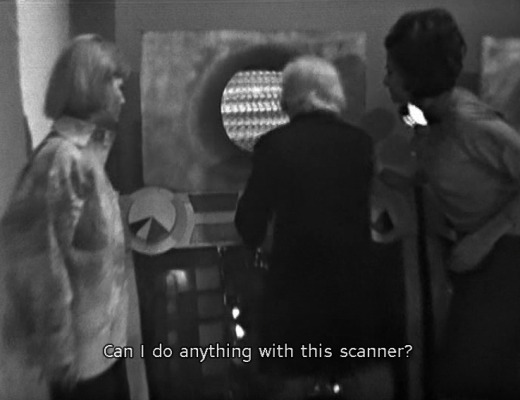
[id: Jenny and Barbara watch as the Doctor stands at the controls of a scanner, the screen of which displays static. The Doctor is saying “Can I do anything with this scanner?” /end id]
The way in which the first ever companion exit is handled is really interesting. By the time we get a few Doctors in, the formula for both regenerations and companion exist becomes fairly established, with either a choice to leave the Doctor behind, after which the Doctor is sad, or a dramatic death in the climax of the story, after which the Doctor is sad. Here, though, half an episode is dedicated to the slow build-up towards that speech which has been deemed iconic enough to be representative of Hartnell for The Five Doctors.
The decision is also not strictly Susan’s, although to say that Dr Who forces her out or leaves her behind would be misrepresenting things - Susan and David’s relationship has actually been built up over the implied time which passes over this serial (I don’t know how long it takes to walk from London to the Daleks’ mine, but it can’t be that fast) and it’s clear from the way she acts during this that while she wants to keep travelling with what’s implied to be the only family and connection to her own culture that she has, as a teenager she also needs some sort of stability in her life, and David could provide part of that, along with the rebuilding of the planet. It’s a shame that the show has never returned to the promise that “one day, I will come back” (although I’m sure it’s been done several times in Big Finish and with books etc) and also immediately taking on another teen girl does make it a little less impactful, but really this is a very effective exit.
Also it makes me excited because next episode is Vicki’s debut, and she’s genuinely one of my favourite companions in the whole show. Sorry Susan lovers.
Fun: 4/5
Production: 3/5, there were shades of it in the last episode of their first story, but this episode’s climax takes the hilariously easy defeat of Daleks to a whole new level.
Pacing: 2/5, because Susan’s exit takes so long, the end to the Dalek plot happens incredibly quickly and slightly out of nowhere, they just decide that one of Barbara’s failed plans from last episode will actually work this time.
Character Writing & Use: 4/5, in fact, the ending is so rushed that Susan doesn’t even get any scenes until her exit. This may have been due to production issues or scheduling during shooting (I didn’t check lol) but it does make her exit a bit of a shock when she was barely present earlier, however I think the strength of that scene makes me forget about that, I think it’s really good.
Depth: 3/5, as much as it makes little narrative sense and strips the Daleks of a lot of their menace very quickly, the defeat of the Daleks through mass resistance to their attempts at control could say something about antifascism if you squint. More significantly, though, Susan’s exit is much more character and theme driven than the often plot-based exits of many of her successors.
Not Ageing Horribly: 3/5, Susan does begin a somewhat irritating trend of female companions who get married off to side characters for no particular reason at the end of their contracts. That being said, this is much less shit than the other times that’s been done, since with Peri that was a last-minute retcon when it’s a miracle that episode ever got made, and with Leela they weren’t even sure she’d be leaving then, whereas here it’s clearly threaded through the story, and other reasons are given.
Overall Score - 19/30
#doctor who#dw#dw review#first doctor#ian chesterton#barbara wright#susan foreman#daleks#companion exit#season 2#16-20
3 notes
·
View notes
Text
Series 4 Episode 11: Turn Left
Yoo here we go, we’re gearing up for the finale of series 4 and so today we’ve got Turn Left! The episode where we see what happens when The Doctor dies. Is it any good? Let’s see.
So as a child, this was my 2nd favourite episode and that’s through pure strength of concept. What would happen if The Doctor wasn’t there to save the world? It’s SUCH a cool concept and it allows the episode to show how integral the “family” The Doctor has on Earth is. Not only does The Doctor die in this episode, but so do his companions as they fight to stop the aliens from Series 3 & 4 taking over the world. Martha and Sarah Jane sacrifice themselves in the Smith & Jones events. Torchwood falls, saving the world from the Sontarans. My childlike imagination went wild imagining how these events went down and that’s no mistake. Just the idea alone makes this episode a classic.
Now is it executed well? Yeah I think so. The pacing is definitely very different to your typical Doctor Who episode though. The episode spends most of its runtime being a tragedy, spiralling into worse and worse areas as more of the world gets fucked up by aliens. It’s a really depressing watch I’m ngl dflkjg, as we see Donna’s mother become straight up depressed and even Wilf struggles to keep his spirit. But I don’t think them doing this is necessarily bad, it’s just straying from the norm which makes sense considering The Doctor isn’t there. Doctor-lite episodes are *the* place to experiment with the show and it’s always interesting to see what writers come up with when they write one of these.
Another thing I want to praise this episode for is setting up the final two episodes of the series, The Stolen Earth & Journey’s End. There are the obvious things, with Rose’s return being hinted at across the whole series and the bees disappearing, but this episode reintroduces you to the characters we’re going to see next episode. Sarah Jane hasn’t been mentioned since series 2, Captain Jack & Torchwood since series 3, etc. As mentioned in the first paragraph, this episode shows how important The Doctor’s family on Earth is by telling us about their fights to save the world in this hypothetical world. It primes you to be reintroduced to these characters, and to get ready for a universe-ending threat.
TL:DR/Overview: I really like Turn Left. It takes the big hypothetical question of “What if The Doctor wasn’t around?” and turns it into a full-on story. I respect it so much for that, and for experimenting with the formula of the show. This alongside the fact that it sets up the next two episodes so well without even needing to hint about the Daleks says it all. For the 5th episode in a row, Series 4 has another S tier. I just can’t help myself can I? :3

3 notes
·
View notes
Note
For the Doctor Who Asks: 2.0 game- All of the questions! (Or all of the ones that you feel like answering.)
Okay, alright!
1. Why do you love Doctor Who so much?
I'm a big fan of sci-fi in general honestly and always have been, especially if it has a lot of media to pick and choose from and lore to sink my teeth into. Doctor Who is specifically very interesting as a time travel show with a rotating cast and media in several different formats which lends itself to perpetual change and creativity and you can revisit prior eras without derailing the current one.
2. Which Doctor would you most want to travel with?
Two or Three. It's no secret that I love Two, Jamie and Zoe so it is ofc a dream to hang out with my faves. Three is kind and considerate of his companions but he's also the realest when people cross him so I think he'd be nice without being Too Nice yk. I made a joke post about this, but he wouldn't beg the Master to regenerate after tormenting his friends and the entire planet for a year (looking at you, Ten).
3. Which Doctor and Companions would be your perfect Tardis team?
My fave canon team is Two, Jamie and Zoe (Though Five, Tegan and Turlough is also great) but a non canon team? Uhhh. Two, Jamie and Tegan could be fun because she's a strong personality like Zoe but also a layperson like Jamie. I've already said Jamie and Leela in another post (sensing a pattern but he is my guy), Bill could be great on pretty much any team as a true everyperson because she truly is just Normal. Like, the other TARDIS team members are arguing and she just says something that seems obvious in retrospect but nobody else thought of. She can just cut through bullshit frfr.
4. Would you rather hang out with Jamie Mccrimmon or Sarah Jane Smith?
Jamie. Sorry Sarah Jane but he's my guy.
5. Classic Who or New Who?
Classic. NuWho takes itself so seriously sometimes like it's trying too hard to be Mature™ and distance itself from the "silly show for nerds" reputation the Classic series got. I appreciate the budget and the added emphasis on emotional arcs but watching the Doctor go through the same character arc again and again and make a speech about how much murder they've done and how ~morally ambiguous~ they are at least once per season is tiring. This is why later One era, Two, Three and Early Four is peak Doctor Who to me. They're just a bit of a tetchy guy travelling the universe and helping people.
6. Would you rather be a Dalek or a Cyberman?
Would I rather be shot or shot? Hmm. If I choose Cybermen can I be one of the good ones like Bill?
7. What's your favourite story from each Doctor 1-15
Okay, That's tough so I'll give a maximum of 3 per Doctor.
One: Planet of the Giants, The Celestial Toymaker and The War Machines
Two: The Evil of the Daleks, The Mind Robber and The War Games
Three: The Mind of Evil, Day of the Daleks and The Three Doctors
Four: The Arc in Space, The Sun Makers, and State of Decay
Five: Castrovalva, Earthshock and Frontios.
Currently on Six's era and not familiar with Seven or Eight.
I don't remember most of NuWho well enough to comment rn (planning on a rewatch once I'm done with Classic) but for Tenteen (who shouldn't be a separate Doctor to Ten but whatever) it's obviously Wild Blue Yonder and 15 only has two stories which are both kinda mid.
8. Do you think any creatures have been overused? If so, which ones?
Yes. Daleks, Cybermen and to a lesser extent, the Master. The Daleks are a one trick pony, and their one trick can be done better by other villains. The Cybermen are interesting but aren't always utilised effectively/are overused. The Master is more versatile as a three dimensional character and a Time Lord who can regenerate and therefore, change personality but is still sometimes overrelied on where re/introducing other three dimensional villains would have more variety.
9. Who is your favourite Doctor Who writer?
Umm, I don't really have favourite writers? I have stories I enjoy but I don't really have a specific writer where I'm like "This guy gets it!"
10. What is your favourite piece of music from Doctor Who?
And if I say the theme tune is that a cop out? It's just so good.
11-15. Are about Torchwood and Sarah Jane Adventures and I've never watched Torchwood and can't remember enough about SJA.
Thanks for asking!
0 notes
Text
A Sci-Fi Worlds Interview with Lance Parkin

Richard Thomas: Just want to start by saying thanks for giving me and the Sci-Fi Worlds readers the time to answer these questions. It's really appreciated, so thanks.
I first became a fan of Doctor Who after my dad bought me the VHS video release of Genesis of the Daleks when I was about five or six I think. After that I started watching the Doctor Who repeats on UK Gold. How did you first become a fan of the series and did you have a particular favourite adversary and/or story growing up?
Lance Parkin: I've been a fan longer than I remember. I vaguely remember the pterodactyl in Invasion of the Dinosaurs. The first story I've got vivid memories of is Pyramids of Mars. I've always been startlingly uncritical about Doctor Who. I love it all. 'My' Doctor Who is Tom, Lalla and K9, my favourite era is the Rebecca Levene Golden Age of the New Adventures, I adore the new series.
Richard Thomas: With the advent of blogs it's probably easier than ever for someone to begin writing. How did you start your writing career and how has it evolved over the years?
Lance Parkin: Virgin took new writers for their Doctor Who range, so I had a go and it worked. It's as simple as that. I wrote a couple of sample chapters for a Doctor Who novel called Just War and sent them in and I got commissioned and the book got published. Then they wanted a follow-up, then another, then another, then another, then Gareth Roberts invited me to become a storyline writer on Emmerdale and, three years after my first book, at the age of 27, I was a full-time writer. I sort of knew I was lucky, but I didn't really understand it at the time.
After Emmerdale, I tried out for a couple of TV shows, but my heart wasn't in it. It's impossible, I think, for a British television viewer of good conscience to sit in the place they make Holby City without having Operation Valkyrie fantasies. So I reached a plateau with my writing a few years ago. I made a (fairly modest) living from being a writer, and that's pretty good going, but I was being hired by the same people who'd always hired me. Don't get me wrong: I'm extremely grateful to all the opportunities all those people have offered. About half the stuff I've done is Doctor Who related. I love Doctor Who, adore it, and the new series opened up new challenges, but I was aware I needed to step things up a little.
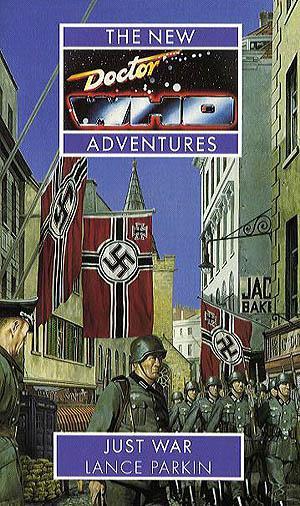
Last year, I finally sat down and decided to write an original novel and try to get an agent. I'd tried this a couple of times before, but nothing ever worked out. This time, I started on a book, an historical novel, that just wasn't clicking. So I started a short story called Fixing Jesus, a completely different thing, wrote that in a day or two and realised I'd written the first chapter of a novel.
After that, things happened surreally fast. I wrote to a few agents, sending them the first few chapters of Fixing Jesus and most of them were very keen. For some reason, I'd done something that just clicked. One agent in particular, though, really understood the book, better than I did. That was Jessica Papin at Dystel and Goderich. I reworked the book pretty much from top to bottom (apart from that first chapter, which is just about word-for-word the way it was as a short story) and she agreed to represent me.
So I'm up off my plateau. I have Fixing Jesus doing the rounds, and hopefully that'll be picked up by someone, I'm also just about to sign a really exciting, really big non-fiction deal I can't talk about yet. After that, I think it'll probably be back to the historical novel.
In terms of blogs and being published … it's easier than ever to be published. It's harder than ever, I think, to be paid to write. The price of printing and distribution is so much lower than it used to be, and small presses can sell books over the internet. But that's always going to be to a limited audience. The major publishers are also making savings where they can, and that's often by not being as generous to writers, either upfront or for things like ebook rights.
I don't believe in the death of print or that people are going to stop reading books. I do think that publishers have a challenge with all the free content on the internet – both the original stuff and the pirated stuff. I think it's most acute with non fiction. Those old-style episode guidebooks have just gone, now. People don't buy glossy 'making of a movie' books, they just watch the bonus DVD disc. Why buy a travel guide when you can just use your phone to find stuff?
I rather grandly see myself as a novelist now, and I think novels are pretty safe. They're still great value for money as an entertainment product.
Richard Thomas: Aside from Doctor Who I see on your website you've also written about the second best science fiction series ever broadcast: Star Trek. What are some of your favourite episodes from the original series and why do you think two sci-fi shows from the 1960s (Doctor Who and Star Trek) continue to be so wildly popular even today?
Richard Thomas: If you were ever approached to write a Doctor Who/Star Trek crossover how do you think you would go about it?
Lance Parkin: I think it would be really difficult. It would be very easy to wallow in how wonderful it was to see the characters meet. Who needs a good story when you can just see Matt Smith arguing with Patrick Stewart or Chris Pine or whoever? What more do you need than Amy in one of those little classic Star Trek uniforms (complaining about how long the skirt is, presumably)?
The thing with crossovers is that one of them always gets to be senior partner. It's very tricky to see a Who/Trek crossover that isn't basically Doctor Who taking the piss. Paul Magrs' book The Blue Angel is a great example, and a great book. Or, flip it around and the Doctor just becomes another guest star who shows up on the Enterprise then goes away again.
My theory's always been that the Borg were a conscious attempt to do a Doctor Who in Star Trek – all the other alien races are all rival powers you can negotiate with. The Borg are basically just monsters out to exterminate, and that makes it very hard for the Federation to deal with them. At the same time … well, the Doctor would have sorted them out in ten minutes because he knows they're allergic to gold or something.
I quite like the idea of the Enterprise stumbling across the Doctor doing something monumentally genocidal to the Daleks at the end of a story and Kirk or Picard stepping in to stop him, and the Daleks going 'thanks, we're just a race of peaceful explorers, I don't know what his problem is', and just telling the Federation what they want to hear while they line up their plan to capture the ship. Throw those two sixties versions of the future at each other – Kennedy era optimists v nuclear war mutants.
Richard Thomas: Your "A History" is easily the most complete chronology of the events of the Doctor Who universe ever printed. Where did the idea to do a complete chronology of the series and its various spin-offs (audio adventures, comic strips, novels etc.) come from and what were some of the biggest difficulties?
Lance Parkin: Well, it started out as a fan production that just covered the TV series. Virgin picked it up, and to be honest the reason the books are in that version is that it would have been far too short if they weren't. That was when there were something like seventy books, and a hundred and fifty TV stories. The last version, the Mad Norwegian one, has about a thousand stories in it and I was very grateful Lars Pearson helped me write that edition.
The trick with the book is simple: Lars and I just list the facts. The Beast Below says that Earth in a thousand years is ravaged by solar flares, Cold Blood says the Silurians emerge then to live in harmony with humanity. Do those things match up? No. Are there ways of reconciling that? See the footnotes for some ideas. Their facts are more important than my theories.
Richard Thomas: You've written several novels including one of the very last past Doctor adventures, The Gallifrey Chronicles. Do you have a favourite novel you've written and who or what do you think has been your biggest influence as a author?
Lance Parkin: I'm never entirely satisfied, I am proud of just about everything of mine that's been published. There are bits in all of them I really love, bits in all of them I wish I could have another go at. If I was going to hand something of mine to someone, it would probably be Warlords of Utopia or The Eyeless. Possibly The Infinity Doctors. The first third of Father Time is pretty special, I think, the second third's not too shabby, the third third … has its moments. I think, technically, I've got better as a writer over the years. I also think that it's not just a matter of technical stuff.
I read a lot. Influential? That's always a tricky one to answer, these things are rarely a straightforward cause-and-effect thing. In terms of the Who stuff, Terrance Dicks, Paul Cornell, Gareth Roberts and Kate Orman, all of whom are brilliant. There's a whole bunch of headline name authors who I love and must have been influenced by – Douglas Adams, Philip Pullman, Borges, Alan Moore, Grant Morrison, Michael Chabon, Iain Banks. I'm a big fan of Ken Macleod, Stephen Baxter and Nicholas Christopher.
Richard Thomas: If the BBC ever revived the past Doctor range do you have any ideas for new novels?
Lance Parkin: I always found the past Doctor books tricky, and the only two I did, Cold Fusion and The Infinity Doctors, cheated. I love my Doctor Who DVDs but I never really saw the point of trying to recreate that in book form, or the attraction of trying to reimagine it. There's a market for it, obviously, and there's obviously that nostalgic appeal. It's the same mentality as cosplaying, I think, the appeal exists in the skilled and forensic reconstruction of something pre-existing. I admire the people who can do it, to an extent, I just don't have that urge myself.
Richard Thomas: You've also written some excellent audio plays for Big Finish. Whose idea was it to do a Davros story that explored the characters genesis, and what do you think it is about the Davros character that resonates with audiences so strongly even today?
Lance Parkin: The Big Finish people always gave me pretty detailed briefs. Davros was part of a short series about notable villains, and Gary Russell told me to delve into Davros' origins. The thing I brought to the table was my belief that Davros was almost certainly a complete git well before his accident. I think fan wisdom before that was that the accident transformed him, hardened him. In my story it does to an extent, but it turns him into this mythical, immortal creature. Before that, he's a horrible human being, doing horrible things to the people around him.
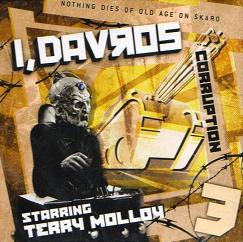
The Daleks are Nazi toddlers, Davros is a sort of Nanny Hitler. The odd thing is that we never really see him in command of the Daleks, not in that Ming the Merciless, Palpatine kind of enthroned way. He skulks in a basement in most of them. I'm not sure what resonates, to be honest. He's visually very distinctive, obviously. I think part of it is that he's constantly plotting against the Daleks, and they're plotting against him.
Richard Thomas: The second edition of "A History" doesn't cover the most recent appearance of Davros in Journey's End, any thoughts on why the Davros we see looks like the Genesis era Davros (plus robotic arm) and not the Emperor Dalek seen in Remembrance of the Daleks? (Other than that Davros looked better.)
Lance Parkin: Well, the robotic arm is obviously the replacement for the one he loses in Revelation of the Daleks, so there's a nod to continuity there. I think the idea of Remembrance is that he's basically just the head in that Emperor casing, everything else has gone, but there's certainly room for the rest of him in there. So I don't see a huge problem. The Time Lords resurrected the Master, so it's only natural the Daleks would come for Davros (again).
Richard Thomas: Thanks Lance, hope we can do this again sometime. Feel free to tell readers where they can find your website and maybe contact you.
Lance Parkin: I've taken the plunge and joined Facebook, so people should feel free to get in touch with me there. I'm also building a website at https://lanceparkin.wordpress.com/
RAED RICHARD THOMAS'S SCI-FI WORLDS COLUMNS FOR BINNALL OF AMERICA
0 notes
Text
Doctor Who: Perfect 10? How Fandom Forgets the Dark Side of David Tennant’s Doctor
https://ift.tt/2URb21b
As recently as September 2020 David Tennant topped a Radio Times poll of favourite Doctors. He beat Tom Baker in a 2006 Doctor Who Magazine poll, and was voted the best TV character of the 21st Century by the readers of Digital Spy. He was the Doctor during one of Doctor Who‘s critical and commercial peaks, bringing in consistently high ratings and a Christmas day audience of 13.31 million for ‘Voyage of the Damned’, and 12.27 million for his final episode, ‘The End of Time – Part Two’. He is the only other Doctor who challenges Tom Baker in terms of associated iconography, even being part of the Christmas idents on BBC One as his final episodes were broadcast. Put simply, the Tenth Doctor is ‘My Doctor’ for a huge swathe of people and David Tennant in a brown coat will be the image they think of when Doctor Who is mentioned.
In articles to accompany these fan polls, Tennant’s Doctor is described as ‘amiable’ in contrast to his predecessor Christopher Eccleston’s dark take on the character. Ten is ‘down-to-earth’, ‘romantic’, ‘sweeter’, ‘more light-hearted’ and the Doctor you’d most want to invite you on board the TARDIS. That’s interesting in some respects, because the Tenth Doctor is very much a Jekyll and Hyde character. He’s handsome, he’s charismatic, and travelling with him can be addictively fun, but he is also casually cruel, harshly dismissive, and lacking in self-awareness. His ego wants feeding, and once fed, can have destructive results.
That tension in the character isn’t due to bad writing or acting. Quite the contrary. Most Doctors have an element of unpleasantness to their behaviour. Ever since the First Doctor kidnapped Ian and Barbara, the character has been moving away from the entitled snob we met him as, but can never escape it completely.
Six and Twelve were both written to be especially abrasive, then soften as time went on (with Colin Baker having to do this through Big Finish audio plays rather than on telly). A significant difference between Twelve and Ten, though, is that Twelve questions himself more. Ten, to the very end, seems to believe his own hype.
The Tenth Doctor’s duality is apparent from his first full appearance in 2005’s ‘The Christmas Invasion’. Having quoted The Lion King and fearlessly ambled through the Sycorax ship in a dressing gown, he seems the picture of bonhomie, that lighter and amiable character shining through. Then he kills their leader. True, it was in self-defence, but it was lethal force that may not have been necessary. Then he immediately topples the British Prime Minister for a not dissimilar act of aggression. Immediately we see the Tenth Doctor’s potential for violence and moral grey areas. He’s still the same man who considered braining someone with a rock in ‘An Unearthly Child’.
Teamed with Rose Tyler, a companion of similar status to Tennant’s Doctor, they blazed their way through time and space with a level of confidence that bordered on entitlement, and a love that manifested itself negatively on the people surrounding them. The most obvious example in Series 2 is ‘Tooth and Claw’, where Russell T. Davies has them react to horror and carnage in the manner of excited tourists who’ve just seen a celebrity. This aloof detachment results in Queen Victoria establishing the Torchwood institute that will eventually split them apart. We see their blinkers on again in ‘Rise of the Cybermen’, when they take Mickey for granted. Rose and the Doctor skip along the dividing line between romance and hubris.
Then, in a Christmassy romp where the Doctor is grieving the loss of Rose, he commits genocide and Donna Noble sucker punches him with ‘I think you need somebody to stop you’. Well-meaning as this statement is, the Doctor treats it as a reason to reduce his next companion to a function rather than a person. Martha Jones is there to stop the Doctor, as far as he’s concerned. She’s a rebound companion. Martha is in love with him, and though he respects her, she’s also something of a prop.
This is the series in which the Doctor becomes human in order to escape the Family of Blood (adapted from a book in which he becomes human in order to understand his companion’s grief, not realising anyone is after him), and is culpable for all the death that follows in his wake. Martha puts up with a position as a servant and with regular racist abuse on her travels with this man, before finally realising at the end of the series that she needs to get out of the relationship. For a rebound companion, Martha withstands a hell of a lot, mostly caused by the Doctor’s failings.
Read more
TV
Why David Tennant Lost Hannibal Role According to Bryan Fuller
By Kirsten Howard
TV
Staged: BBC Comedy Confirms Sheen & Tennant’s Double-Act Greatness
By Louisa Mellor
Series 4 develops the Doctor further, putting the Tenth’s Doctor’s flaws in the foreground more clearly. Donna is now travelling with him, and simply calls him out on his behaviour more than Rose or Martha did. Nonetheless the Doctor ploughs on, and in ‘Midnight’ we see him reduced to desperate and ugly pleas about how clever he is when he’s put in a situation he can’t talk himself out of.
Rose has also become more Doctor-like while trapped in another reality, and brutally tells Donna that she’s going to have to die in order to return to the original timeline (just as the Doctor tells Donna she’s going to have to lose her memories of travelling with him in order to live her previous life, even as she clearly asks him not to – and how long did the Doctor know he would have to do this for? It’s not like he’s surprised when Donna starts glitching). Tied into this is the Doctor’s belief in his own legend. In ‘The Doctor’s Daughter’ he holds a gun to Cobb’s head, then withdraws it and asks that they start a society based on the morals of his actions. You know, like a well-adjusted person does.
What’s interesting here is that despite presenting himself as ‘a man who never would’, the Doctor is a man who absolutely would. We’ve seen him do it. Even the Tenth Doctor, so keen to live up to the absolute moral ideals he espouses, killed the Sycorax leader and the Krillitanes, drove the Cybermen to die of despair, brought the Family of Blood to a quiet village and then disposed of them personally. But Tennant doesn’t play this as a useful lie, he plays it as something the Doctor absolutely believes in that moment, that he is a man who would not kill even as his daughter lies dead. It’s why his picking up a gun in ‘The End of Time’ has such impact. And it makes some sense that the Tenth Doctor would reject violence following a predecessor who regenerated after refusing to commit another double-genocide.
In the series finale ‘Journey’s End‘, Davros accuses the Doctor of turning his friends into weapons. This is because the Doctor’s friends have used weapons against the Daleks who – and I can’t stress this enough – are about to kill everyone in the entire universe. Fighting back against them seems pretty rational. Also – and again I can’t stress this enough – the Daleks are bad. Like, really bad. You won’t believe just how mindbogglingly bad they are. The Doctor has tried to destroy them several times by this point. Here, there isn’t the complication of double-genocide, and instead the very real threat of absolutely everyone in the universe dying. This accusation, that the Doctor turns people into weapons, should absolutely not land.
And yet, with the Tenth Doctor, it does. This is a huge distinction between him and the First Doctor, who had to persuade pacifists to fight for him in ‘The Daleks’.
In ‘The Sontaran Strategem’ Martha compares the Doctor to fire. It’s so blunt it almost seems not worth saying, but it’s the perfect analogy (especially for a show where fire is a huge part of the very first story). Yes, fire shines in dark places, yes it can be a beacon, but despite it being very much fire’s entire deal, people can forget that it burns. And fire has that mythical connection of being stolen from the gods and brought to humanity. The Time Lord Victorious concept fits the Tenth Doctor so well. Of all the Doctors, he’s the most ready to believe in himself as a semi-mythic figure.
Even when regenerating there’s a balance between hero and legend: the Tenth Doctor does ultimately save Wilfred Mott, but only after pointing out passionately how big a sacrifice he’s making. And then he goes to get his reward by meeting all his friends, only to glare at them from a distance. His last words are ‘I don’t want to go’, which works well as clearly being a poignant moment for the actor as well, but in the context of Doctor Who as a whole it renders Ten anomalous: no one else went this unwillingly. And yet, in interviews Russell T. Davies said it was important to end the story with ‘the Doctor as people have loved him: funny, the bright spark, the hero, the enthusiast’.
It’s fascinating then, that this is the Doctor who has been taken to heart by so many viewers because there’s such an extreme contrast between his good-natured front, his stated beliefs, and his actions. He clearly loves Rose and Donna, but leaves them with a compromised version of happiness. They go on extraordinary journeys only to end up somewhere that leaves them less than who they want to be, with Russell T. Davies being more brutally honest than Steven Moffat, who nearly always goes the romance route. Davies once said to Mark Lawson that he liked writing happy endings ‘because in the real world they don’t exist’, but his endings tend towards the bittersweet: Mickey and Martha end up together but this feels like they’re leftovers from the Doctor and Rose’s relationship. The Tenth Doctor doesn’t, as Nine does, go with a smile, but holding back tears.
cnx.cmd.push(function() { cnx({ playerId: "106e33c0-3911-473c-b599-b1426db57530", }).render("0270c398a82f44f49c23c16122516796"); });
It’s a testament to how well written the Tenth Doctor is that the character has this light and shade, and with David Tennant’s immense likeability he can appeal to a wider audience as a result. It’s not surprise he wins all these polls, but I can’t help but feel that if the Doctor arrived and invited me on board the TARDIS, I’d want it to be anyone but Ten.
The post Doctor Who: Perfect 10? How Fandom Forgets the Dark Side of David Tennant’s Doctor appeared first on Den of Geek.
from Den of Geek https://ift.tt/3iaqbDk
65 notes
·
View notes
Text
DOCTOR WHO TOP 10 - 1st Doctor
So, I threatened to do this a while ago, and I'm finally ready. This is my first top 10 in a series of Doctor Who top 10s.
Expanded universe wil be included, always. Let's go.
10. A Big Hand for the Doctor

Out of the 11 Doctors, 11 stories anthology, this might be my favourite one? Although a few of the others are great as well.
It's just so... weird. I mean, all of those short stories are likely written by people with little to no knowledge of eu. So Colfer (who I am predisposed to like, because I loved Artemis Fowl as a kid) isn't tied to... I dunno, Quinnis? Operation Proteus? He's probably never even heard of them. So he creates a glimpse of a whole new NewWho-esque era that takes place before Totter's Lane. One that (unlike the one presented in Fugitive of the Judoon) seems actually fun and interesting.
The 1st Doctor had a cybernetic arm for all of his episodes. Why? Because why the fuck not.
9. The Savages
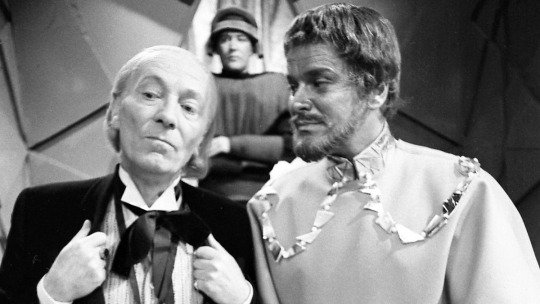
Whenever some weird incel on the internet says "Doctor Who was never about politics!", the correct answer to that is "Shut the fuck up and go watch The Savages." Or it would be, if any of it still existed.
Don't get me wrong - William Hartnell's Doctor Who era was very political. Mostly with "Nazis bad" and "cold war bad", which are both solid takes. But this serial has balls.
It has no monsters, it's just a parable about South Africa. I don't know, I just think it's really cool for this children's sci-fi show in mid-1960s to go "Yeah, fuck apartheid!"
8. The Edge of Destruction
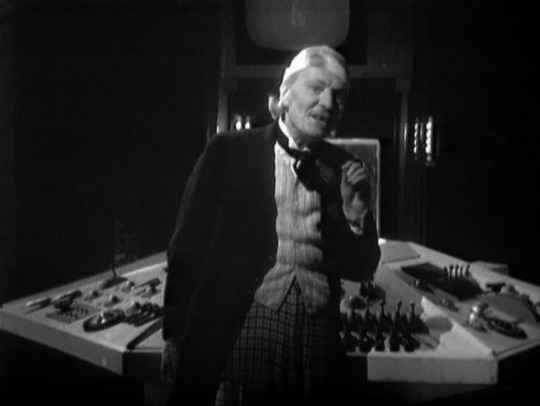
I haven't seen this one for years but from what I remember and what I know about it, I like it a lot. It's just this weird filler, except it's not at all, because it's an integral part of each character's arc. It has a profound weirdness about it which I adore.
It's Doctor Who, as originally intended.
7. Home Truths
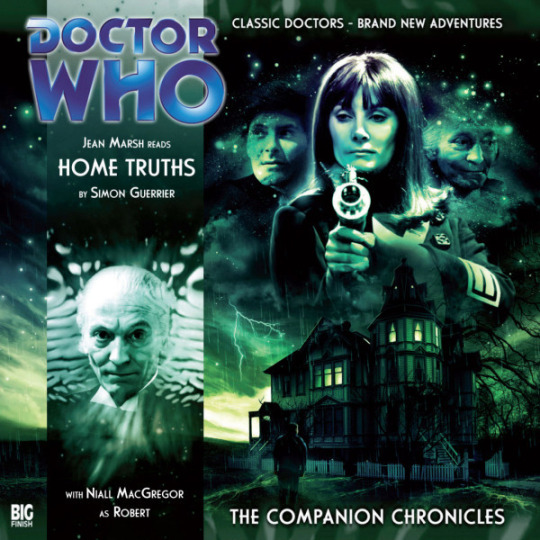
I listened to this one recently for the first time and - wow. Just wow. It's just dripping with atmosphere. I love it a lot and need to listen to the rest of that trilogy now.
6. Dalek Invasion of Earth
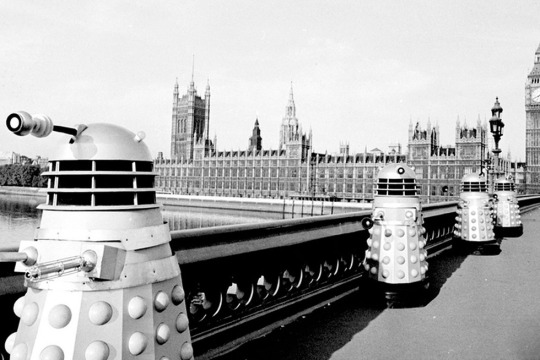
It's the one where the Daleks... actually become the Daleks. From opressors on a futuristic planet, bound to a single city, to galactic conquerors. Iconic, and for very good reasons.
5. Journey Out of Terror
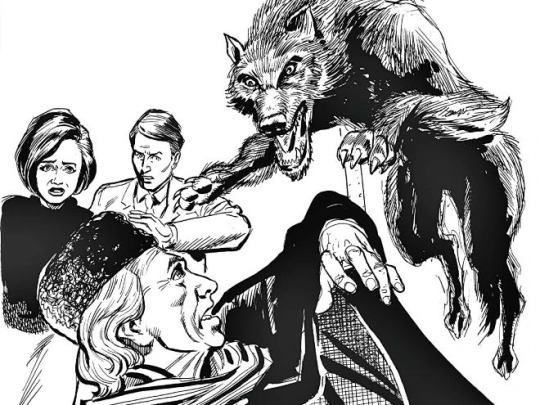
Simon Guerrier is just fucking excelent at writing the 1st Doctor, Ian, and Barbara. There's no way around it, this short story is properly brilliant and you should read it if you haven't done so yet.
4. The Daleks' Master Plan
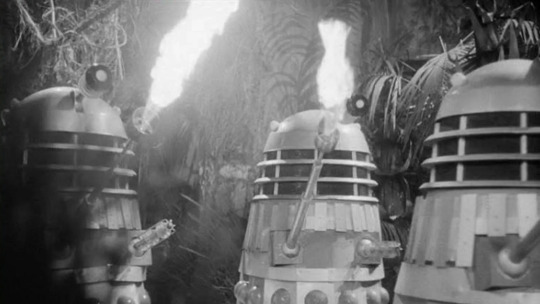
I love the madness of the Master Plan. It's a lot bigger than manageable. It's ambitious and epic and I adore it to bits. It has the Monk! Huge empires! Jumping through time! Cold war parallels! A Christmas special! There's nothing like it. Hopefully more of it returns to the archives one day.
3. The Aztecs
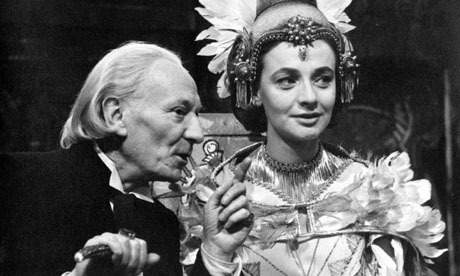
The Aztecs is one of the purest Doctor Who experiences ever. It's really funny, but also quite dark. It has action and adventure, yet stops to think about history and culture, as well as the philosophy of time travel. It feels timeless.
2. The Keys of Marinus
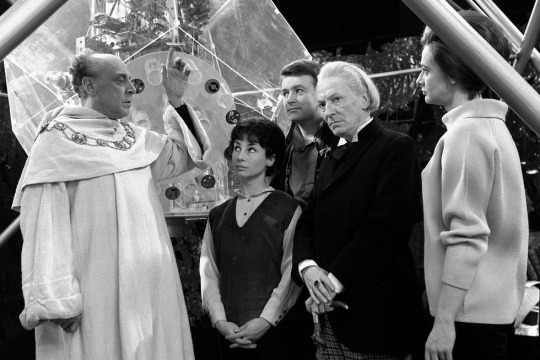
The Keys of Marinus is widely disliked and overall not a beloved story. Which is, of course, bullshit.
I love it so goddamn much. It's the first "Classic Who" serial that was genuinely FUN for me to watch. It made me fall in love with Doctor Who again, in the same way I feel in love the 11th Doctor's era. It's amazing and should be recognised as such.
1. The Time Meddler
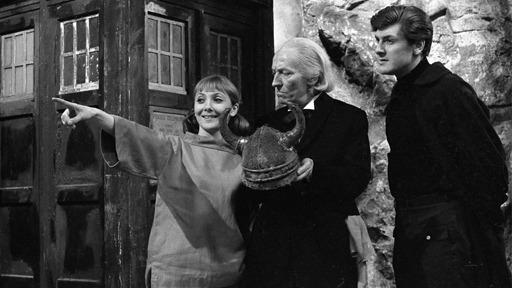
Alright, this is one the most beloved Hartnell era serials. And... for good reasons.
I love this story. It's clever and fun and inovative and just all around marvelous time. I can't help it, the Doctor x Monk rivalry just gets me. The setting is excellent. And it kinda invents the final bits of Doctor Who that weren't invented by Season 1.
17 notes
·
View notes
Text
The Shared Dalek Universe of the 1960s: A Case Study
In 2011 (a little over ten years ago!), El Sandifer cited my dearly-beloved 1960s Who Annuals as examples of stories which ended up influencing the TV series many years down the line despite making an unrepentant hash of continuity.
Her first example is that the Doctor is called Dr. Who, and that he alternates between being from Earth on one page, and not being from Earth three pages later. I would point out that TV was doing much the same thing in those days, and went on flip-flopping basically until Jon Pertwee, so it’s not a terribly good argument to begin with.
However, she spends more time pondering the Daleks of the comics. These Daleks, she notes, are very different from those on television at the time. There are hordes of them, they travel in fleets of saucers, and they’re ruled by the Emperor. This contradiction, she argues, later fed back into the TV series in the RTD era, when huge fleets of Daleks became the norm and, earlier but still well after the first burst of Annuals, in the form of Patrick Troughton facing a very different Dalek Emperor in The Evil of the Daleks.
In no way do I wish to undermine Sandifer’s ultimate conclusion that “canon” in the sense of diegetic consistency is a red herring of little importance, and what matters for any sane definition of ‘canon’ is whether a story is referenced at all, not whether it’s contradicted.
However.
Having gone back to 1966′s The Dalek Outer Space Book, I have made a very startling discovery, in the story entitled The Secret of the Emperor. The rest is after the cut; I will leave you with a delightful panel from this story, showing the “bewildered” Dalek Emperor being bullied by knights at the Battle of Agincourt. (This is one of my favourite Doctor Who images ever, and if it doesn’t put a smile on your face I am not sure I want to take you seriously.)
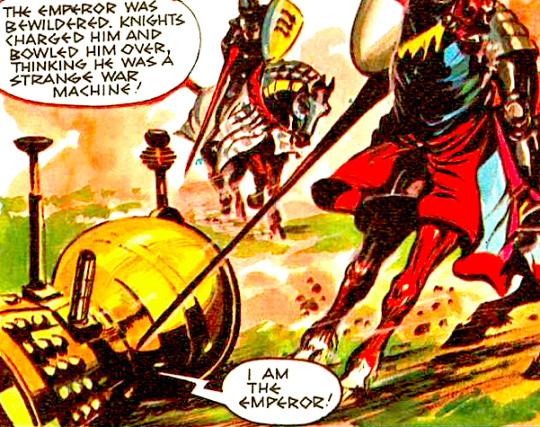
So, famously, when he debuted in the comics, the Dalek Emperor was not the giant, static Dalek later shown on television in The Evil of the Daleks and The Bad Wolf of the Ways; instead, he was golden, squat, and had a bulbous head; to house all the ego, one expects.
Thus, most people will point at the fact that when the Doctor met “the Emperor” in The Evil of the Daleks, he resided in a huge tower-like casing in the Dalek City, as evidence that although ideas received a first treatment in the comics which later made it to screens, no direct continuity was intended; the comics’ Emperor was an alternate, a first draft, to be discarded once a more definitive TV portrayal emerged.
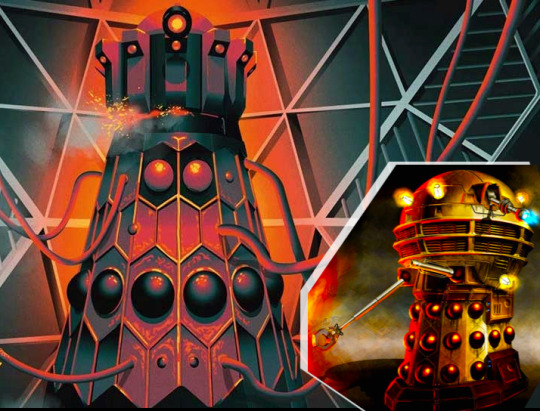
And yet, of course, it is somehow appealing to think of the two as the same Dalek, isn’t it? John Peel (Dalek writer voted most likely to be a 19th century Victorian man who stumbled into a time eddy; it’s mostly the remarkable sideburns) spent a lot of time in his Dalek novels establishing the life story of the Dalek Prime, the First Dalek Ever, who transitioned from the globe-headed casing to the towery Evil one and then deeply regretted it, what with the “getting killed by his own infighting troops with no way to escape”.
But this is usually viewed as a retcon. A cute retcon, an admirable retcon even, but a retcon. My good friend and esteemed fellow canon-welder, @rassilon-imprimatur, espoused such a view four years ago:
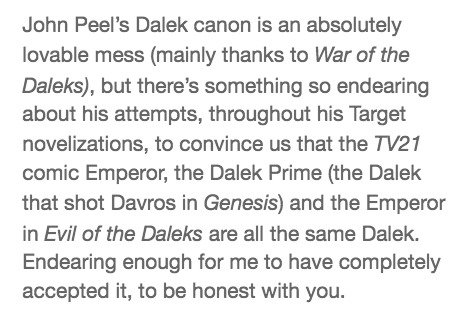
Well, all of this is, if you’ll pardon my French, bollocks. John Peel didn’t make anything up, except for the snappy name of “the Dalek Prime” as a designation for the individual. The Dalek Emperor in Evil of the Daleks was always the Emperor of the 1960s comics, and there is a very good reason for his seemingly-contradictory change of appearance. What’s more, I am not talking about murky authorial intent: these are things that the discerning Dalek fan in 1967 was meant to have known.
Let me wind back the clock to 1966. A Dalek master-plan is unfurling, a multi-media agenda spanning several years, more ambitious perhaps than even Time Lord Victorious in its scope; for the ultimate aim of a small cabal of men including David Whitaker, Terry Nation and Brad Ashton is nothing less than spinning the Daleks out of Doctor Who and into their own non-BBC TV show — to be made in America, and in colour, if you please!
For over a year now, a Dalek story arc has been running in the pages of TV Century 21, tracking the early rise of the Dalek Empire and its early interactions with 2060s humanity. Though the Daleks encroach over other parts of the book, including the headline stories, the bulk of this story arc comes in the form of weekly one-page comics making up one long serialised history of the Daleks, under the minimalist title of The Daleks.

Also under the solo brand of “The Daleks”: Annuals, an exclusive audio story, and, of course, toys. Time for Phase Two. It is time to end the Daleks’ endless confrontations with Dr Who on television, and set the stage for a new status quo able to support the TV series Nation dreams about.
Important background: Terry Nation, famously, does not like the Dalek Emperor. Whitaker made him up without consulting Nation, who maintains that the highest rank in the Dalek hierarchy should be the Dalek Supreme. The Emperor was hard to do away with in the comics, since he was basically the protagonist of the TV21 strip, but one imagines Nation was keen to jettison him from the world of the planned TV series.
I am speculating, of course, but I picture Nation sitting in his office, pondering the two great thorns in the side of the Independant Daleks Masterplan.
Thorn one: the Daleks are entangled with the Doctor both diegetically and symbolically; unless something can be done, the Daleks will remain “the Doctor’s enemies”, and a show where they commit evil and the Doctor fails to show up would ring false with the kids watching. The Daleks must be removed from Doctor Who in a sensational and definitive manner, or the whole enterprise is a nonstarter.
Thorn two: I, Terry Nation, have foolishly allowed David Whitaker to shape the lore of the Daleks, and he has made this Dalek Emperor guy very central to early Dalek history, leading up to the 22nd century Dalek Invasion of Earth that most of the Doctor’s subsequent conflicts with the Daleks have stemmed from. But I do not like the Dalek Emperor. I wish I could get rid of him in my new status quo.
…………Aha.
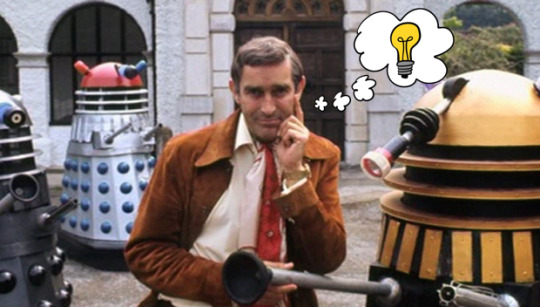
A triumphant Terry Nation adds a post-it note to the ever-widening corkboard representing the multimedia Dalek Masterplan setting up the TV series, which must already include things like “convince Jean Marsh to come back as Sara Kingdom”. Notes distilled from this corkboard will form the backbone of The Dalek Outer Space Book, this year’s Dalek annual, which exists principally to set up the prospective main characters of the new TV series: Sara Kingdom and Agent Mark Seven, of the Space Security Service.
The new post-it note reads:
Construe the Daleks’ enmity with the Doctor as a personal enmity between the Doctor and the Emperor, a la Sherlock Holmes and Moriarty. Have the Doctor triumph over the Emperor on TV in a big ‘event’ story.
Result: the Doctor-vs-Daleks storyline is over; the Emperor is dead; I get everything I ever wanted.
(Except maybe a pony.)
Then he phones David Whitaker, smirking all the while like an evil genie preparing to grant a badly-worded wish.
“Good news, old chap, I’ve decided you can write a new Dalek story for the BBC, all by yourself. I promise I won’t interfere.”
*confused and delighted David Whitaker noises*
“ And you can even bring in that Dalek Emperor of yours. Yes, you heard me!”
*Whitaker enthusiasm intensifies*
“Ahhh, but there’s a catch. The Dalek Emperor must DIE.”
Of course, like all good Faustian bargains, this is irresistible even though it is ruinous and the victim knows it to be ruinous. Whitaker agrees to the scheme. He and Nation begin planning out the events of the great finale of the Dalek-Doctor confrontation, which will hit the screens in 1967 as the mildly racist, but otherwise quite well-loved, ‘The Evil of the Daleks’.
Quickly enough, it is decided that Patrick Troughton crouching to berate the short and bubble-headed Golden Emperor would look silly. If the Emperor appears on TV, alongside human performers, then it should tower over them. Besides, this is to be the archvillainous Dalek Emperor’s last stand, and certain traditions must be followed.
Hence another task is added to the bucketlist of the Dalek Outer Space Book: tell the story of how the Emperor transformed from the globe-headed dwarf to some huge and terrible towering form under the Dalek City, for the Doctor to stumble onto later. This rebuilt Emperor may be teased, but must not be truly seen or truly defeated in the book; that would defeat the whole idea.
Hence, The Secret of the Emperor, a story which sees the Emperor becoming self-conscious about his own efficiency and letting the Scientist Daleks rebuild his casing from scratch. The final page is a splash panel, a delightfully nonsensical diagram of the mechanical components of the new casing.
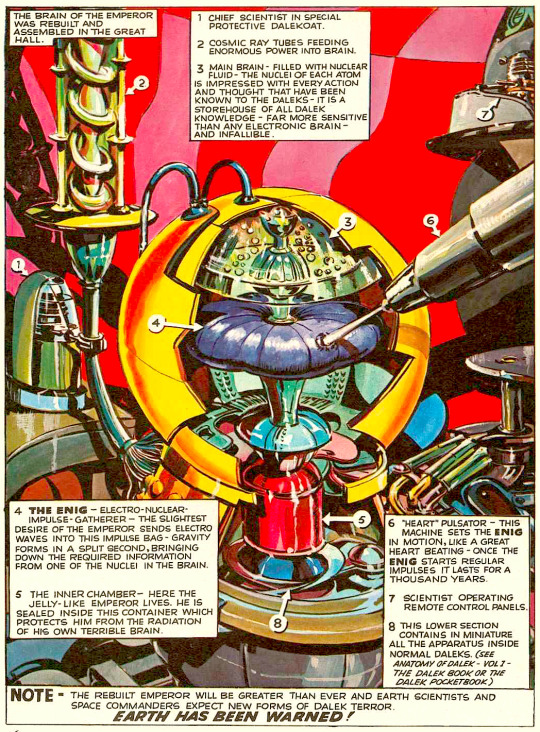
The almost surreal array of colours and shapes is so arresting as to obscure an important detai. Many have seen this page over and over, and yet still missed it. The recent(ish) ‘Anatomy of the New Dalek Emperor’ artwork from Time Lord Victorious clearly looked at this page for reference, in spite of the fact that the TLV Emperor is much more inspired by the old Emperor than the rebuilt one.
Let me spell it out for you: look at the Scientist Daleks in the top right and centre-left. Look at them.
The new Emperor is huge.
And what else?
That Scientist on the left is plugging huge wires snaking from the wall into the tower-casing.
He now resides in the Great Hall of the Dalek City.
The background wall is a weird checkered pattern.
In addition, the following facts are seeded throughout the earlier pages of The Secret of the Emperor.
The point of moving to the new casing was to grant the Emperor increased brain capacity (suitable for concocting masterplans).
He acquired said increased brain capacity to help the Daleks attempt to overcome humanity once and for all.
The Emperor has recently had a trautmatic but eye-opening experience with time travel.
Ignore the fact that the Emperor was here depicted with what appears to be a still fairly bulbous, and golden, head, and it doesn’t take a genius to figure out that this is very, very direct setup for how the Doctor finds the Dalek Emperor in The Evil of the Daleks — tower-like, in an imperial throneroom in the Dalek City, with a checkered wall pattern, planning out a complicated scheme to harness time travel as a means of defeating humanity once and for all!
Yes, the designs don’t quite match — but how could the artist behind the visuals of Secret of the Emperor have known precisely what Shawcraft would build, a year later, based on the same basic description by Nation & Whitaker? The parallels far outweigh the minor differences in execution. (It’s worth noting that elsewhere in the Outer Space Book a different artist drew what was clearly intended to be the Golden Emperor as a large, golden, but normally-proportioned Dalek, so it’s not like the visual descriptions of these scripts were exceedingly precise…)
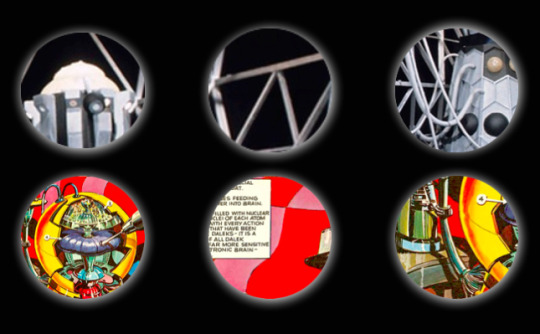
The rebuilt Emperor is never seen in the Outer Space Book outside of this ‘dissection’: he is heard throughout The Brain Tappers but kept carefully off-panel, and his new and dangerous new casing is pointedly not destroyed in the story’s conclusion. Well, of course not. That’s what Dr Who is for.
tl;dr: it is not a post hoc retcon, or even a secret, that the round-headed Emperor of the comics became the Dalek Emperor of Evil of the Daleks. A holistic view of the state of Dalek media in 1966-1967 shows that, in fact, it was the whole point that this be the Emperor of the comics; and that the comics had begun setting this up long before Patrick Troughton encountered Edward Waterfield on TV.
And thus, to circle back to Sandifer’s 2011 post, it is not enough to simply say that the “seemingly non-canon” comics inspired the show down the line. In fact in this instance, what appeared on Doctor Who existed for the benefit of the Daleks spin-off — not vice-versa!
#Daleks#Canon-Welding#Doctor Who#Analysis#Doctor Who Meta#Dalek Emperor#Dalek Prime#The Evil of the Daleks#Terry Nation#David Whitaker#Brad Ashton#The Secret of the Emperor#El Sandifer#Canon#Jacob Black
70 notes
·
View notes